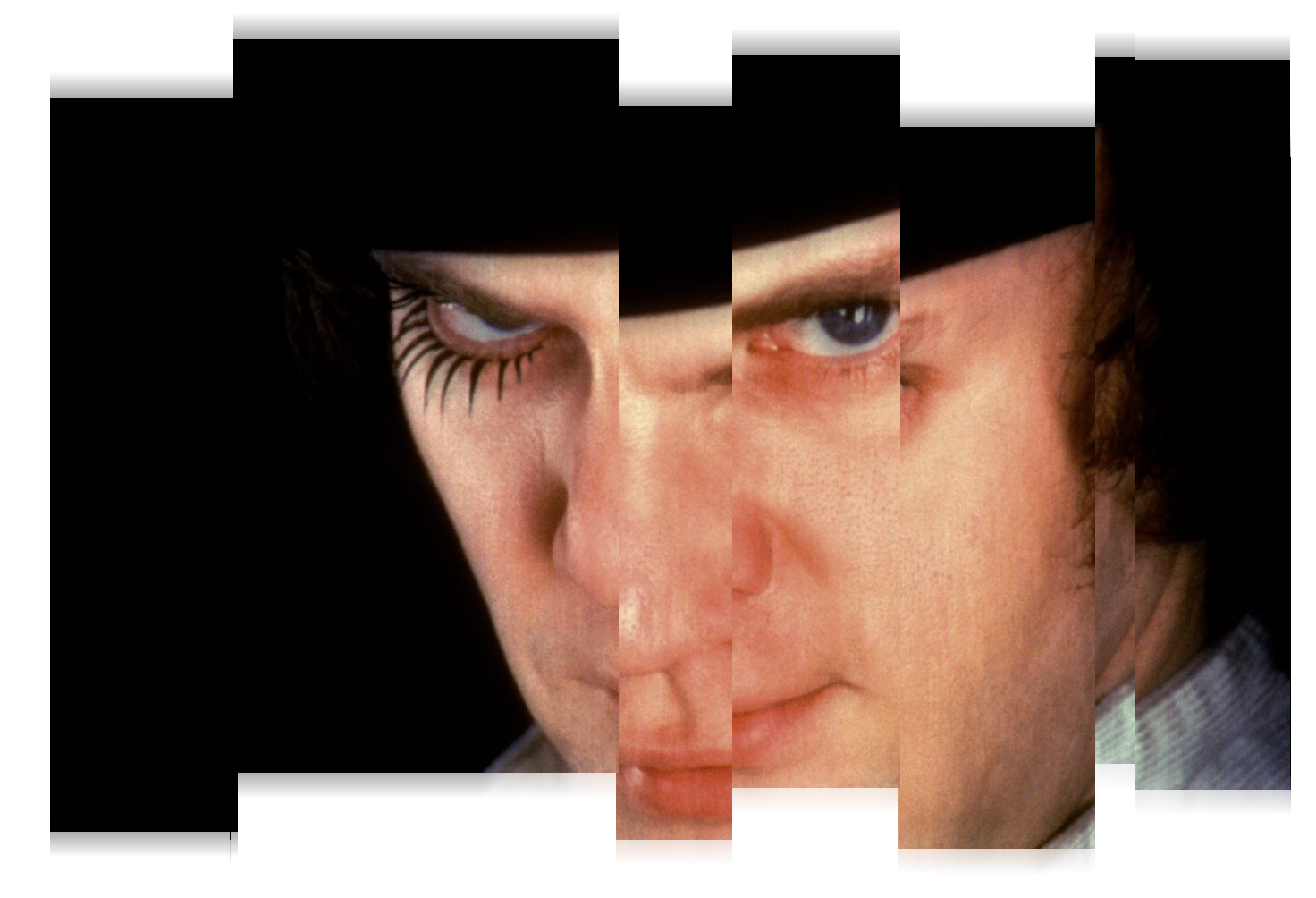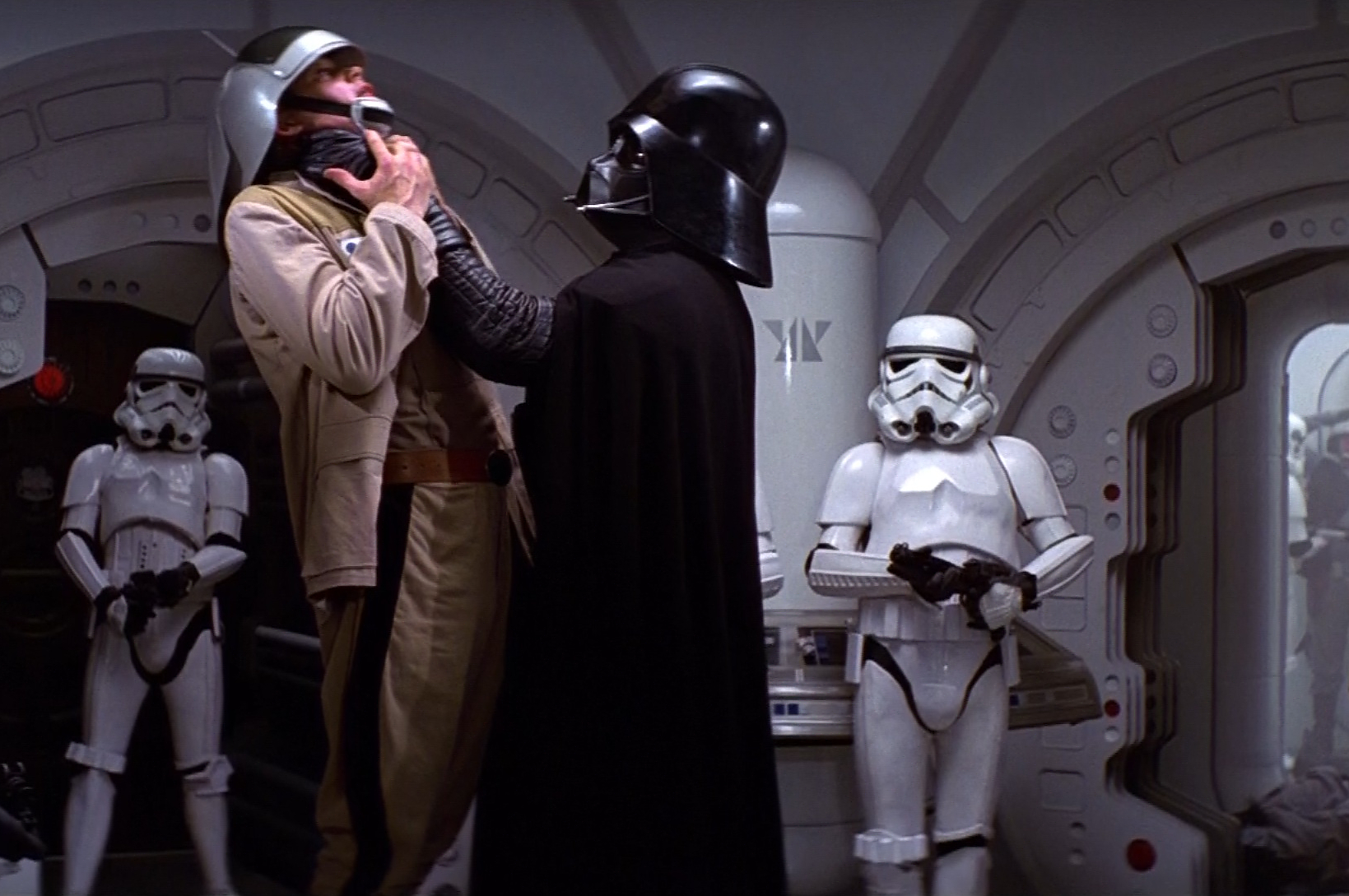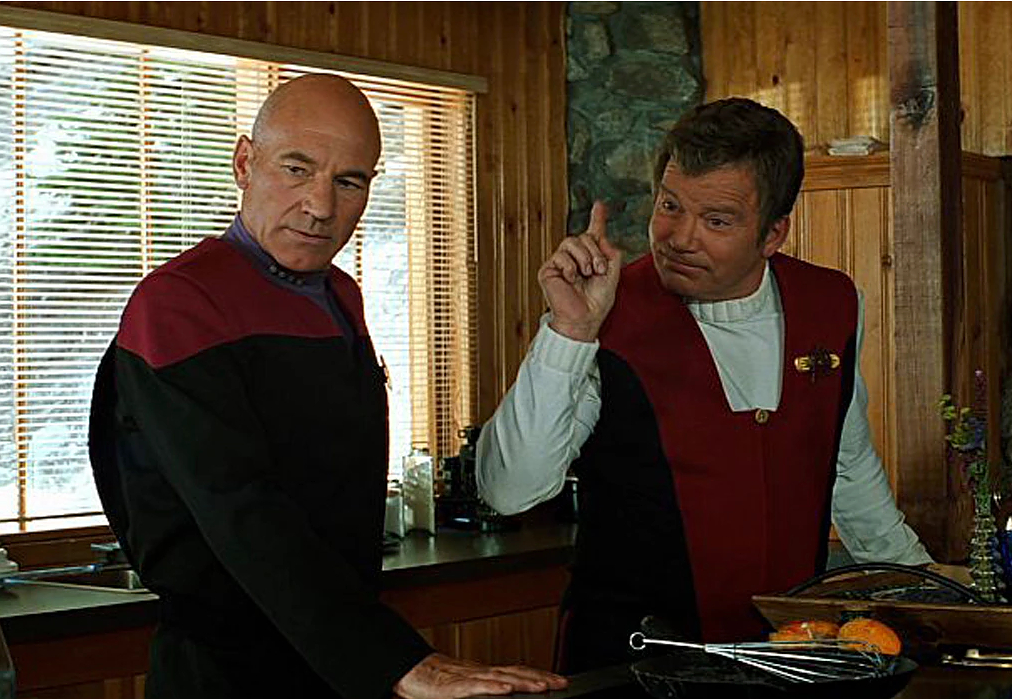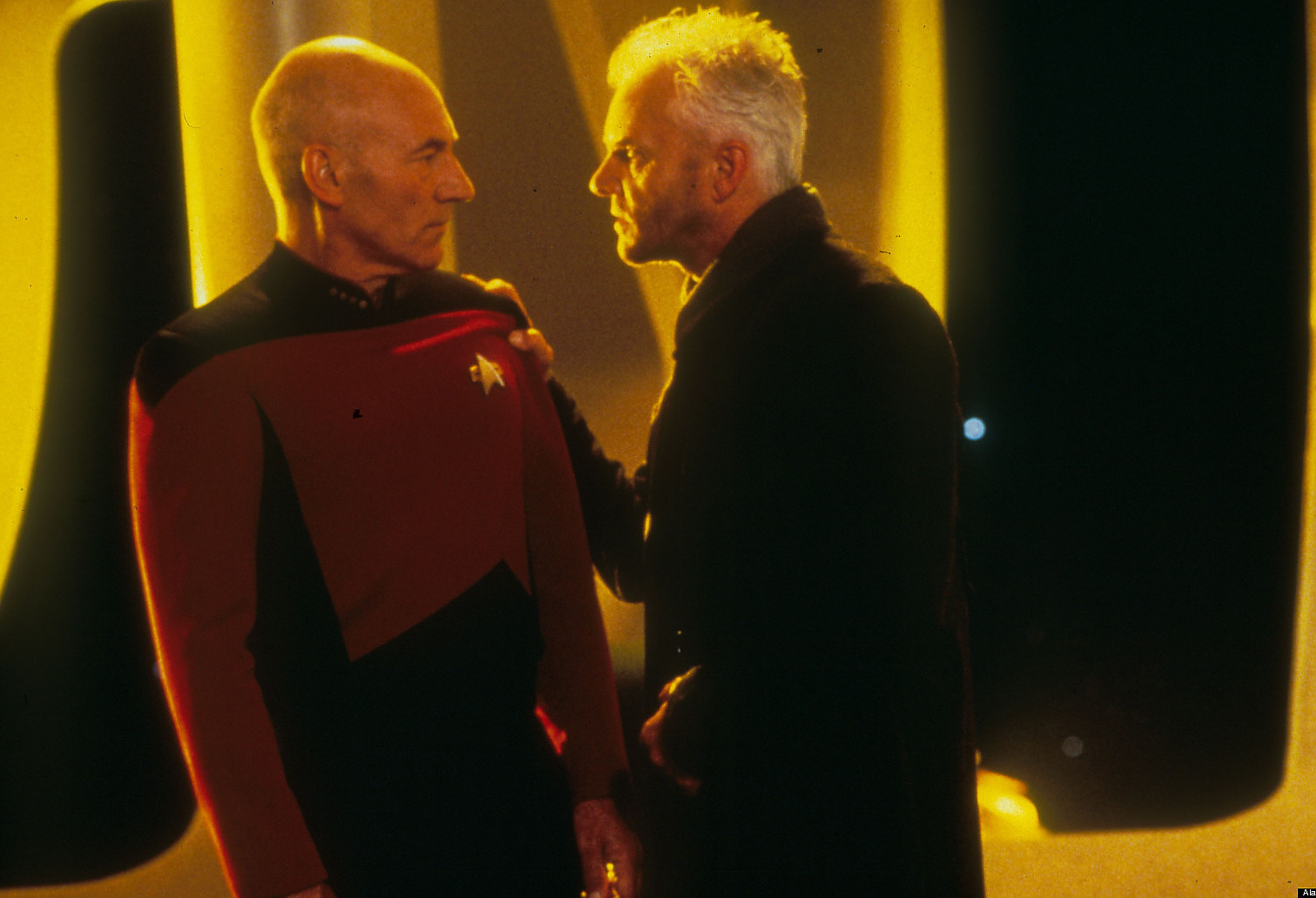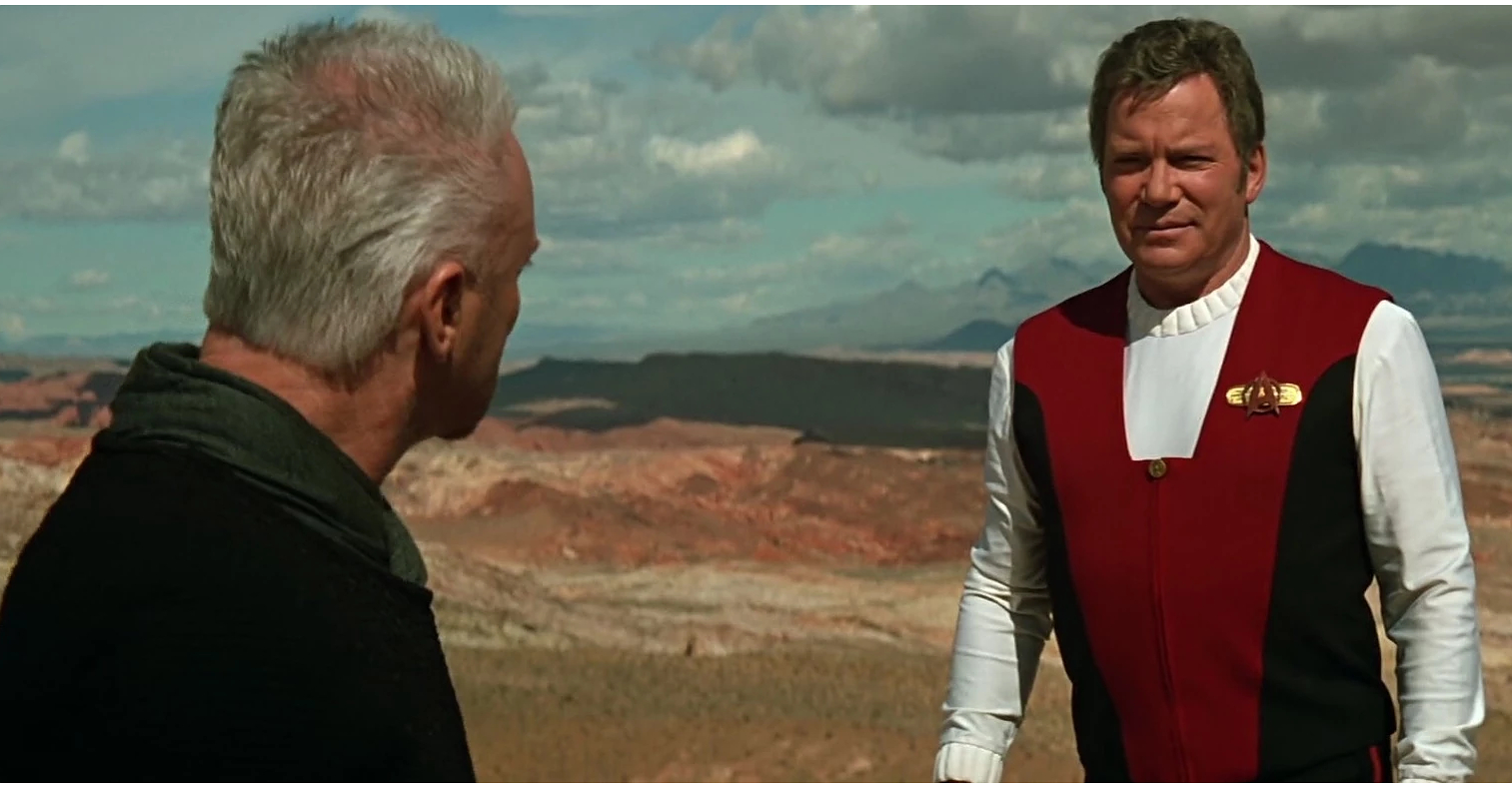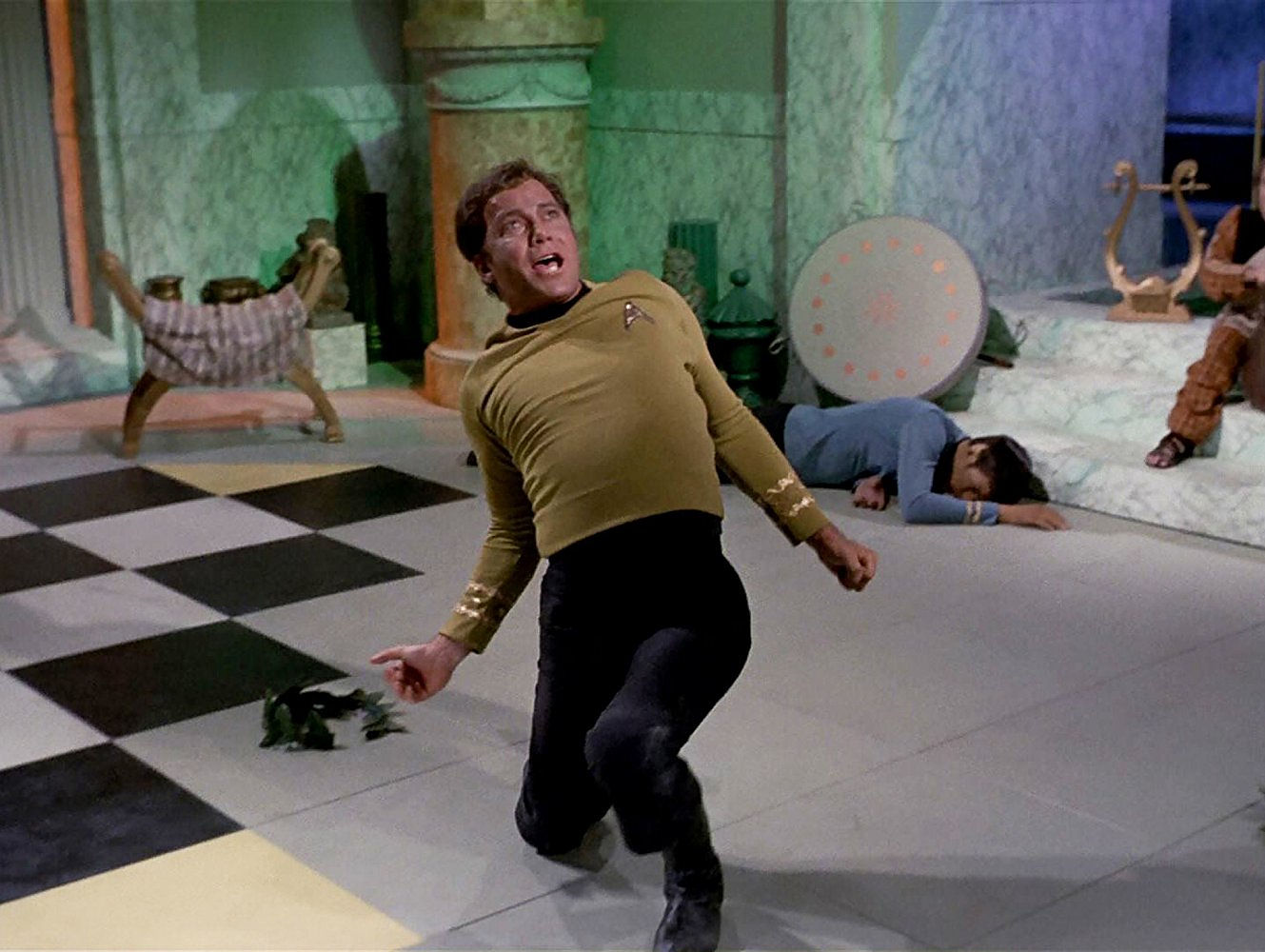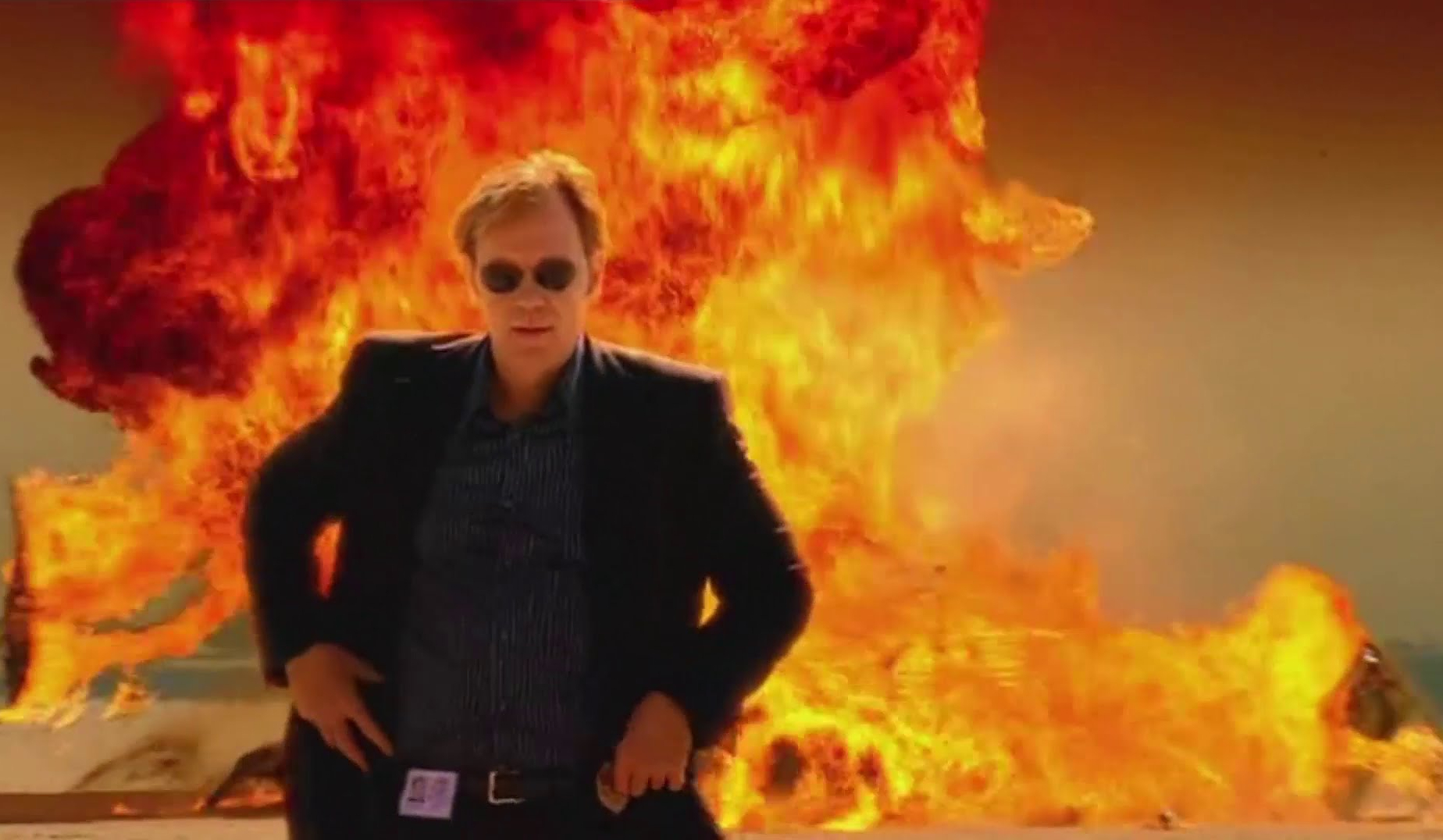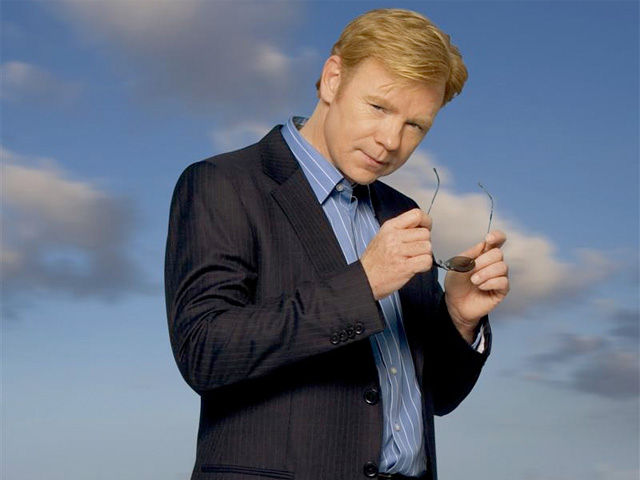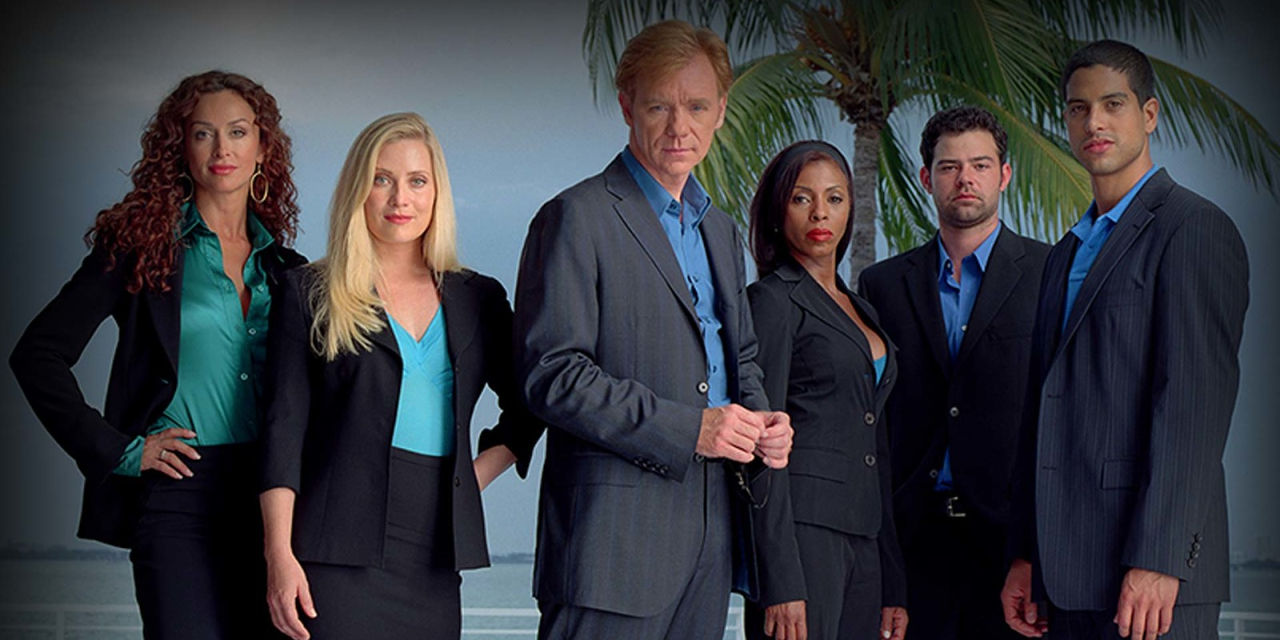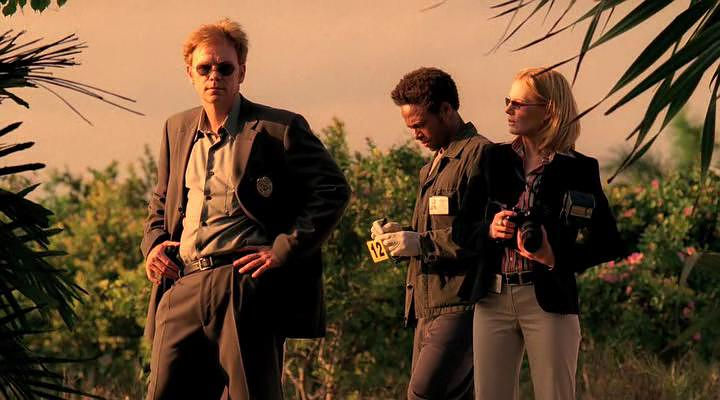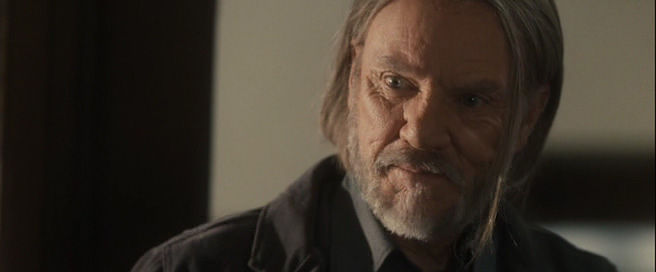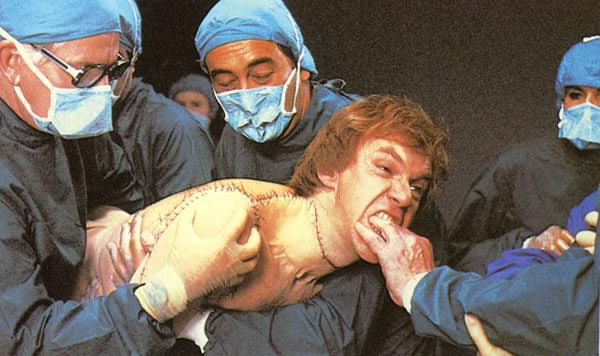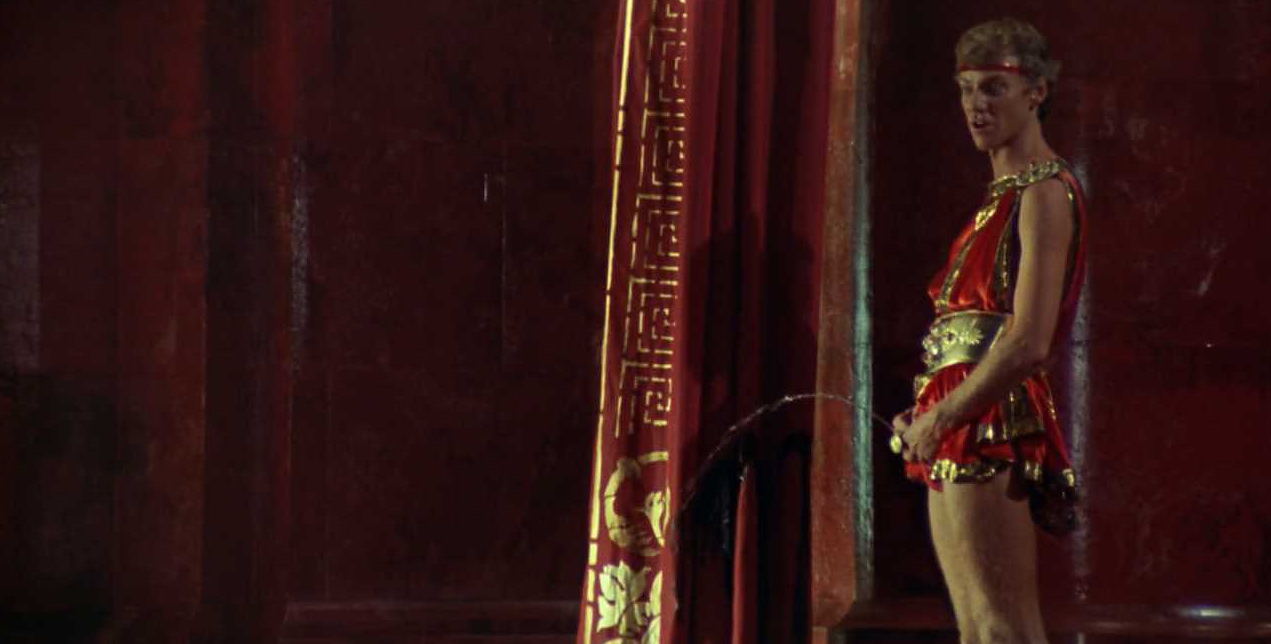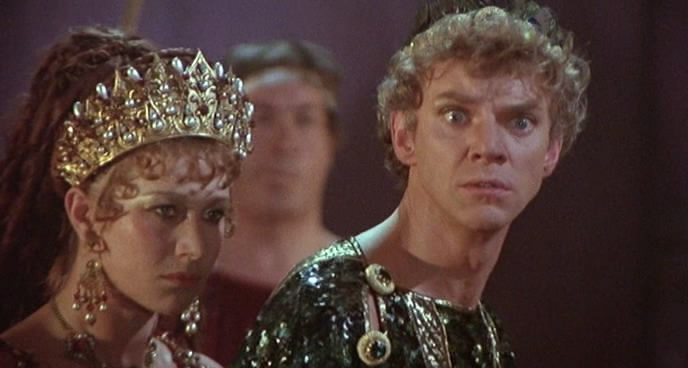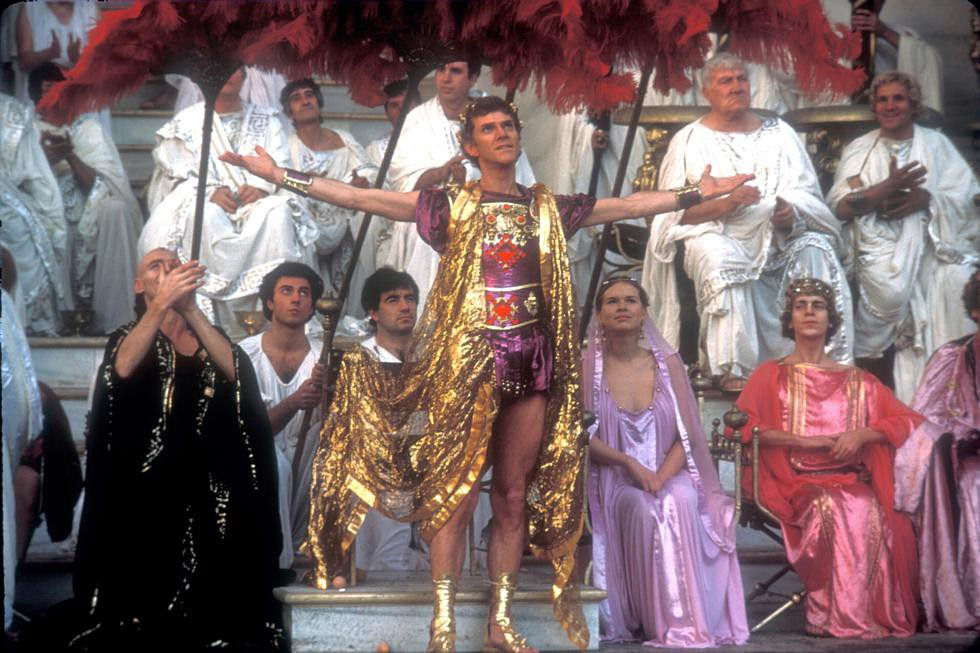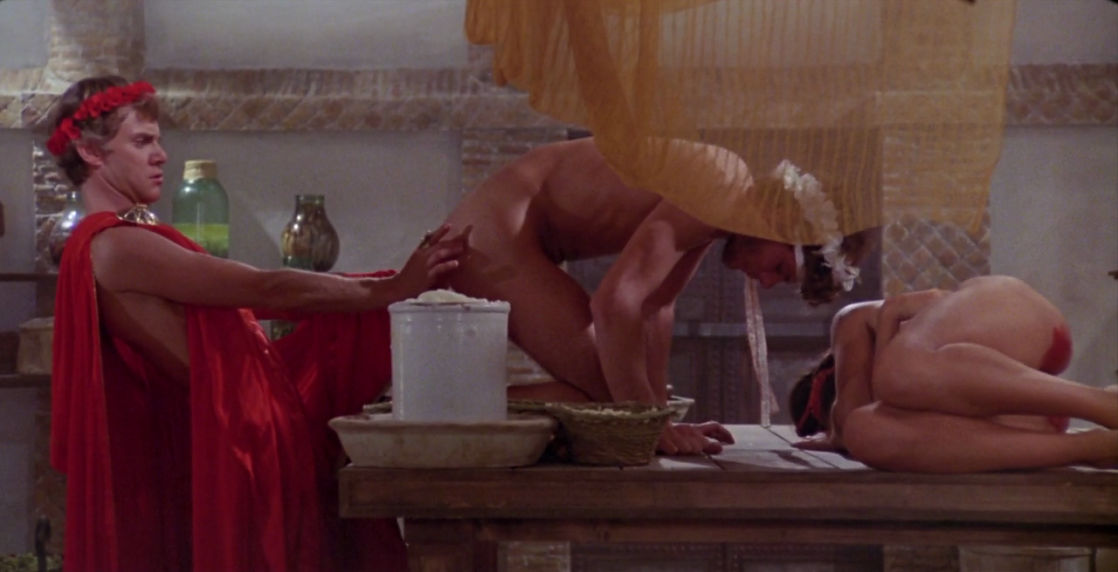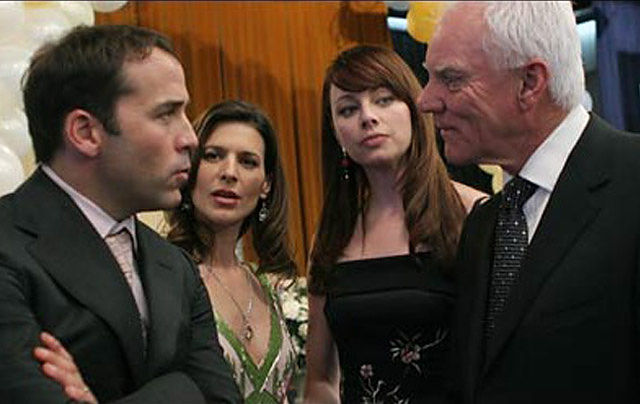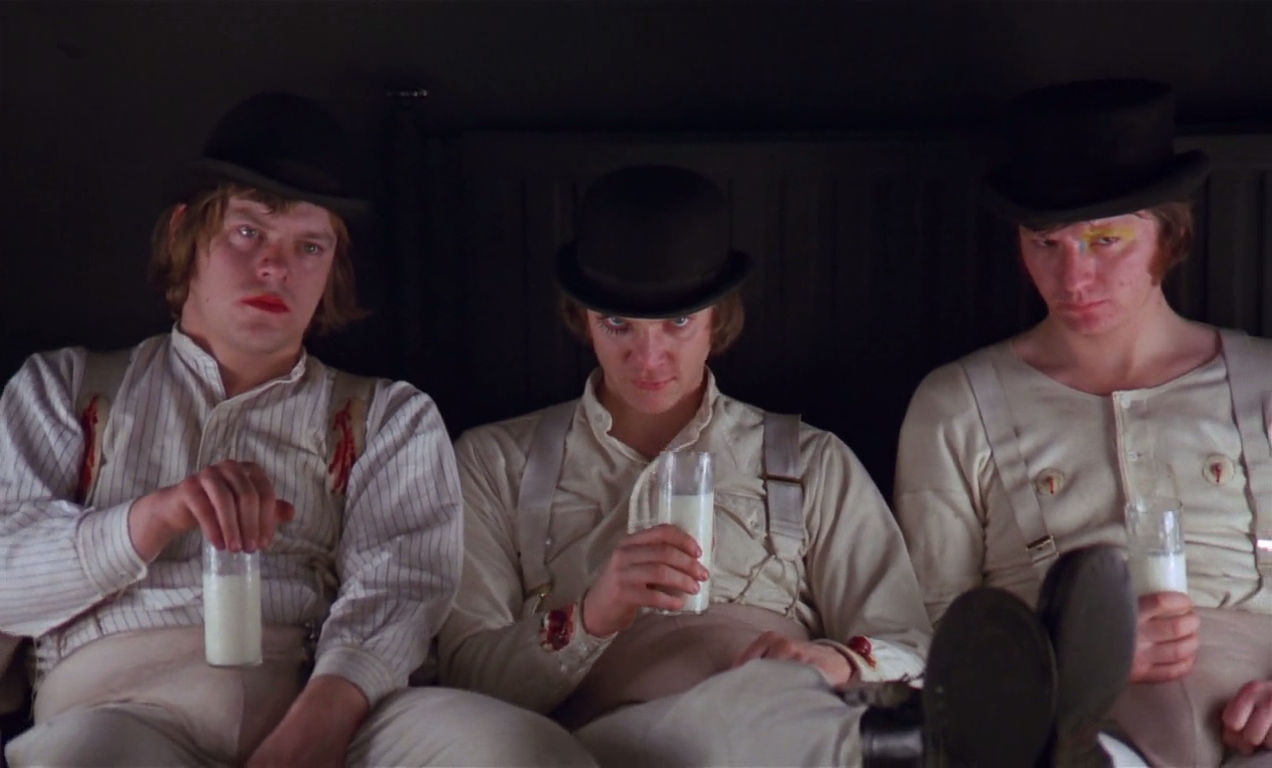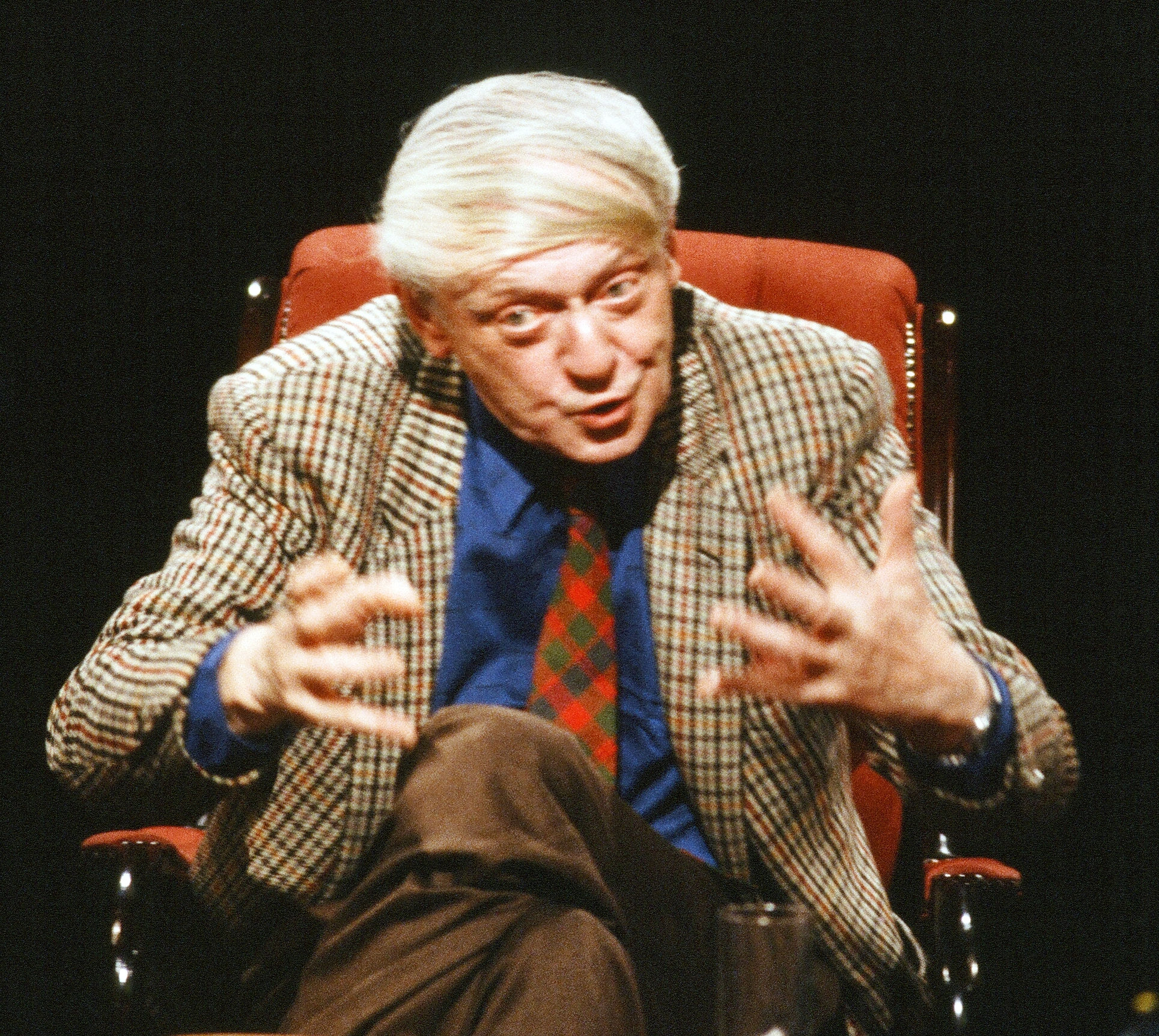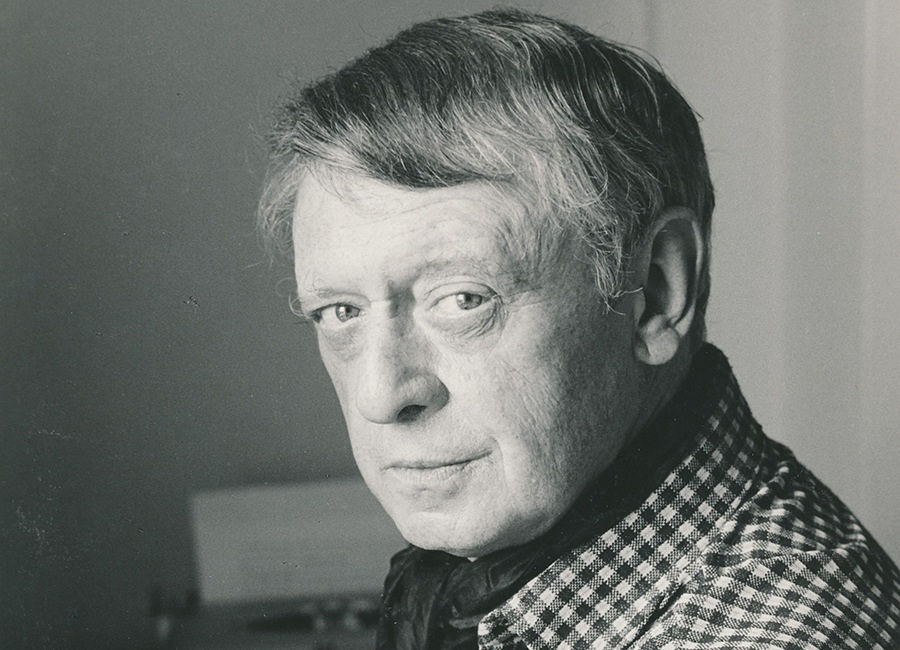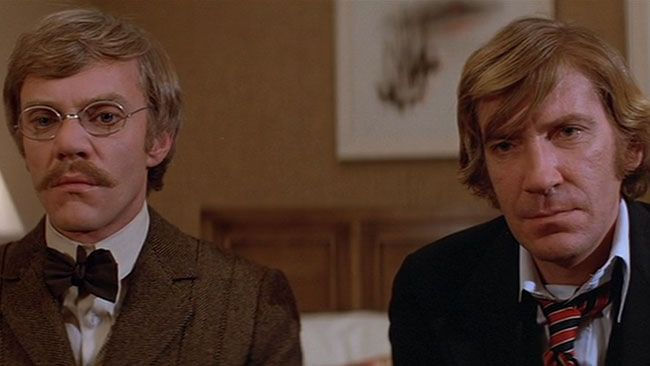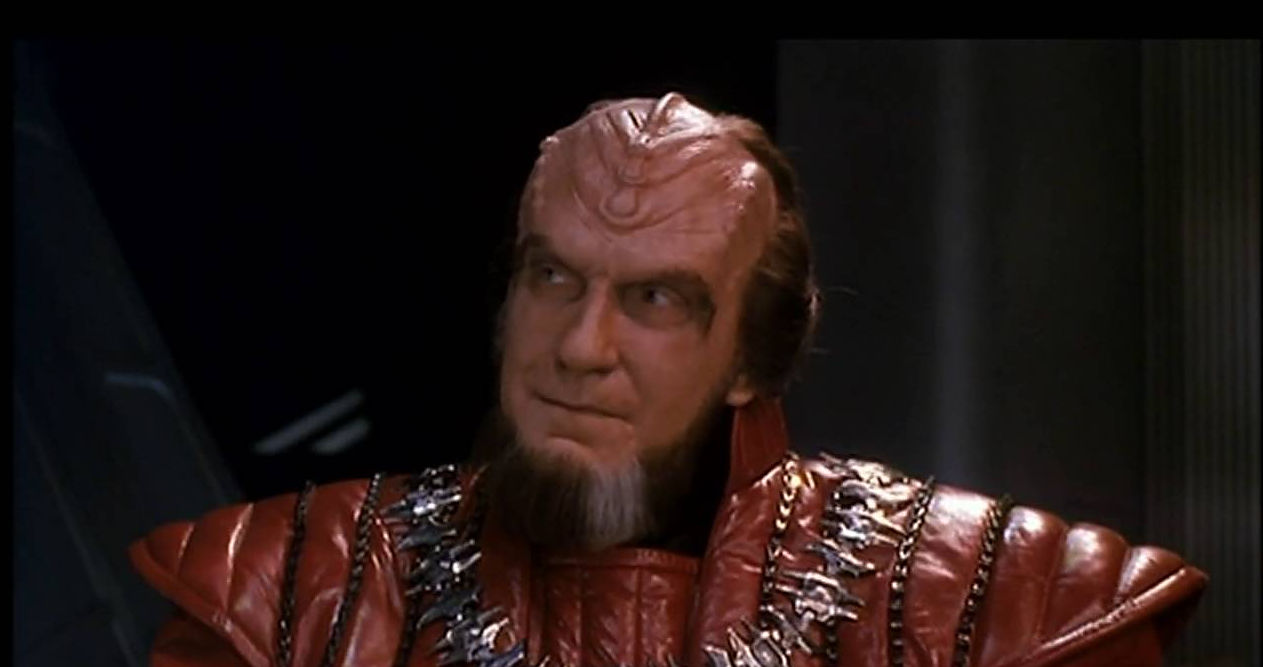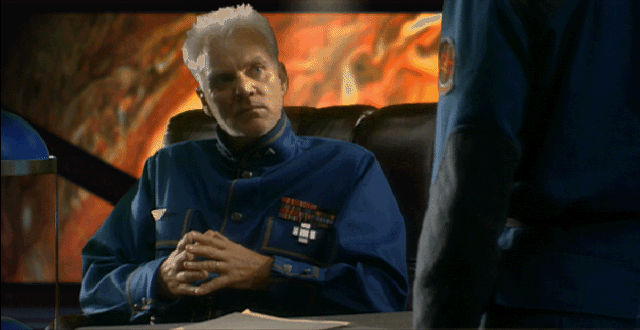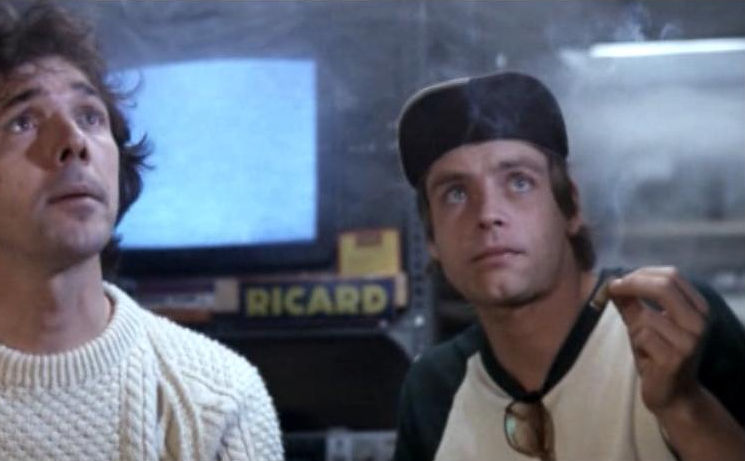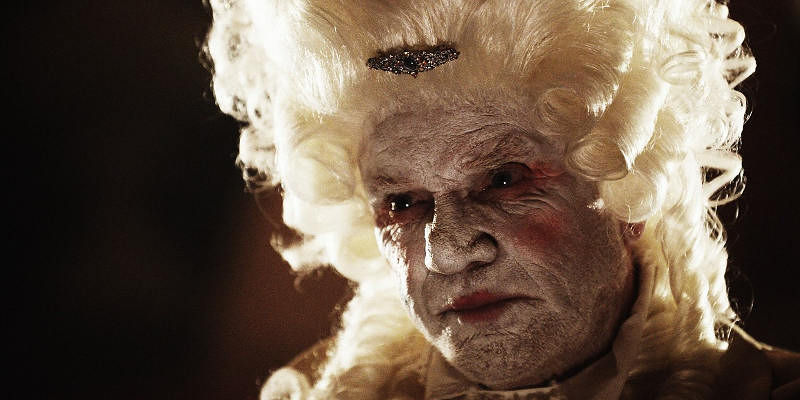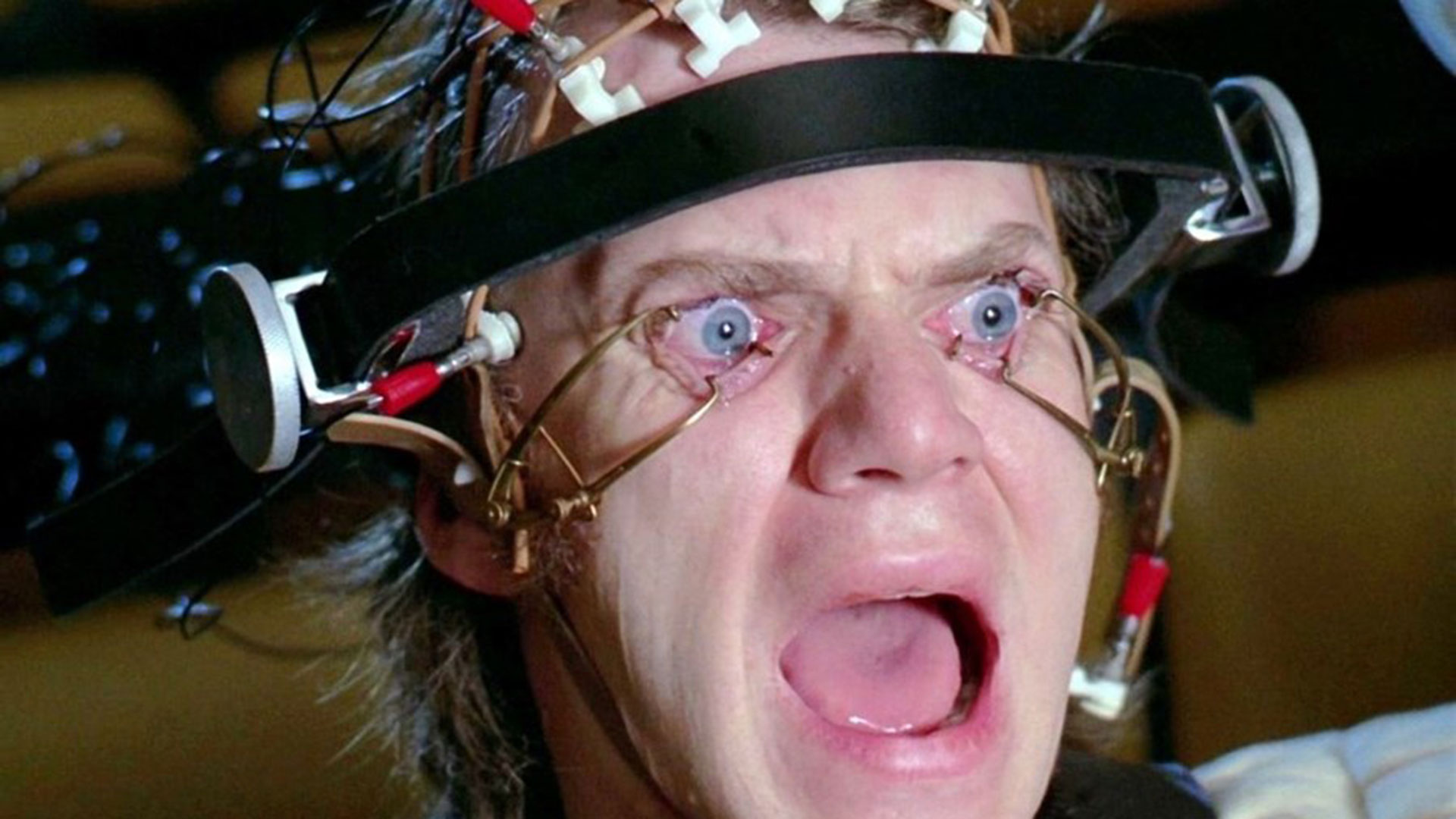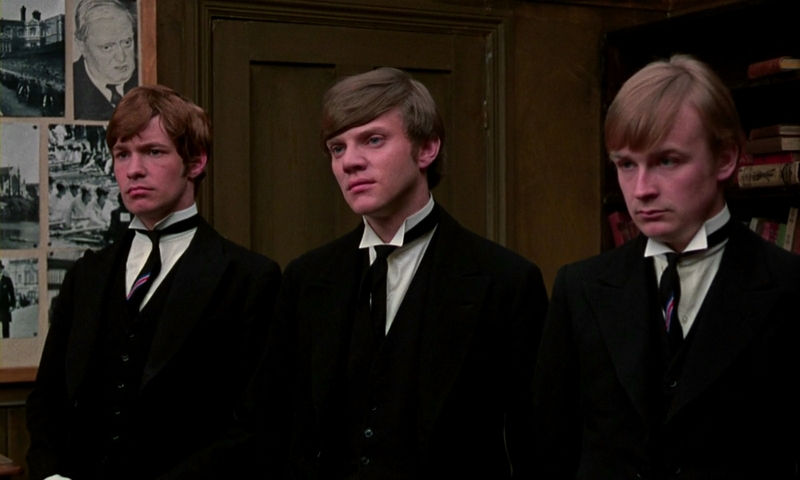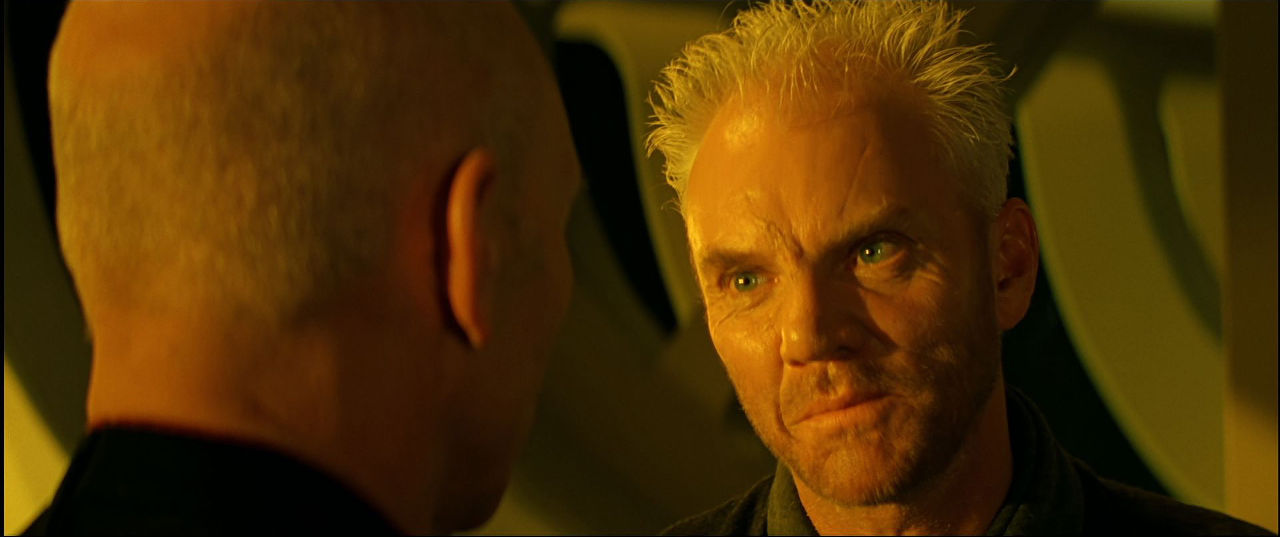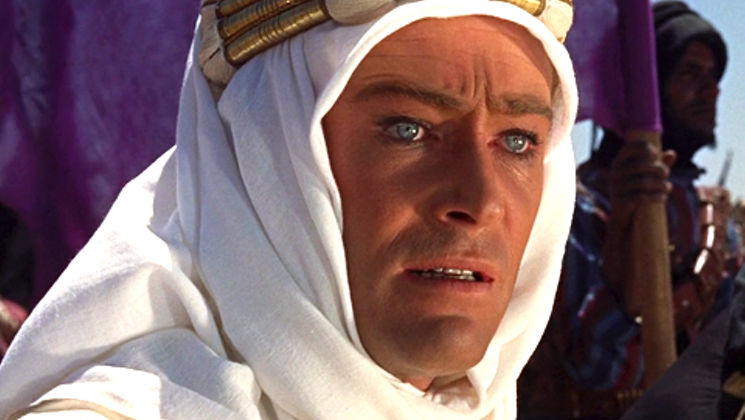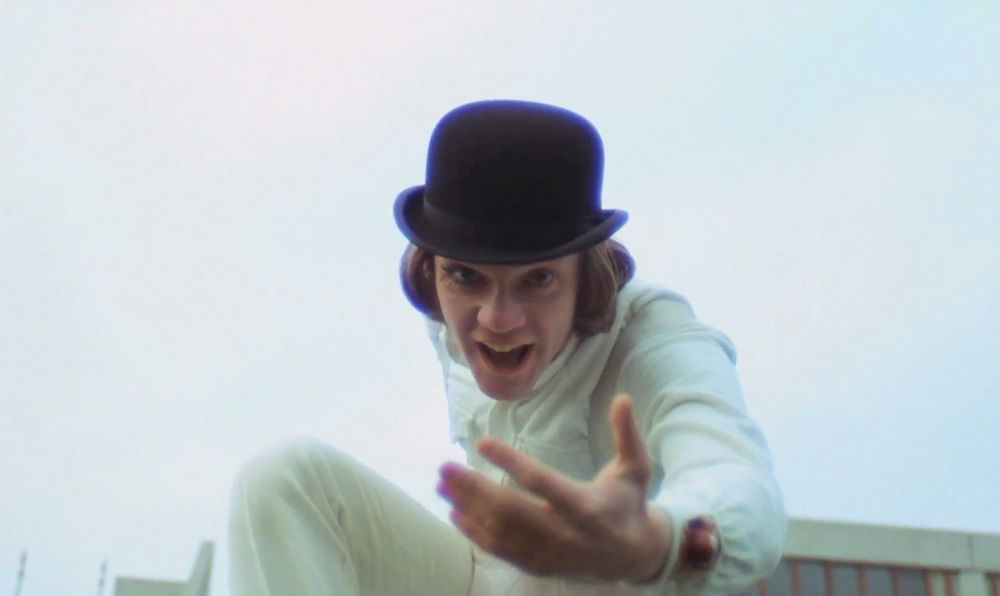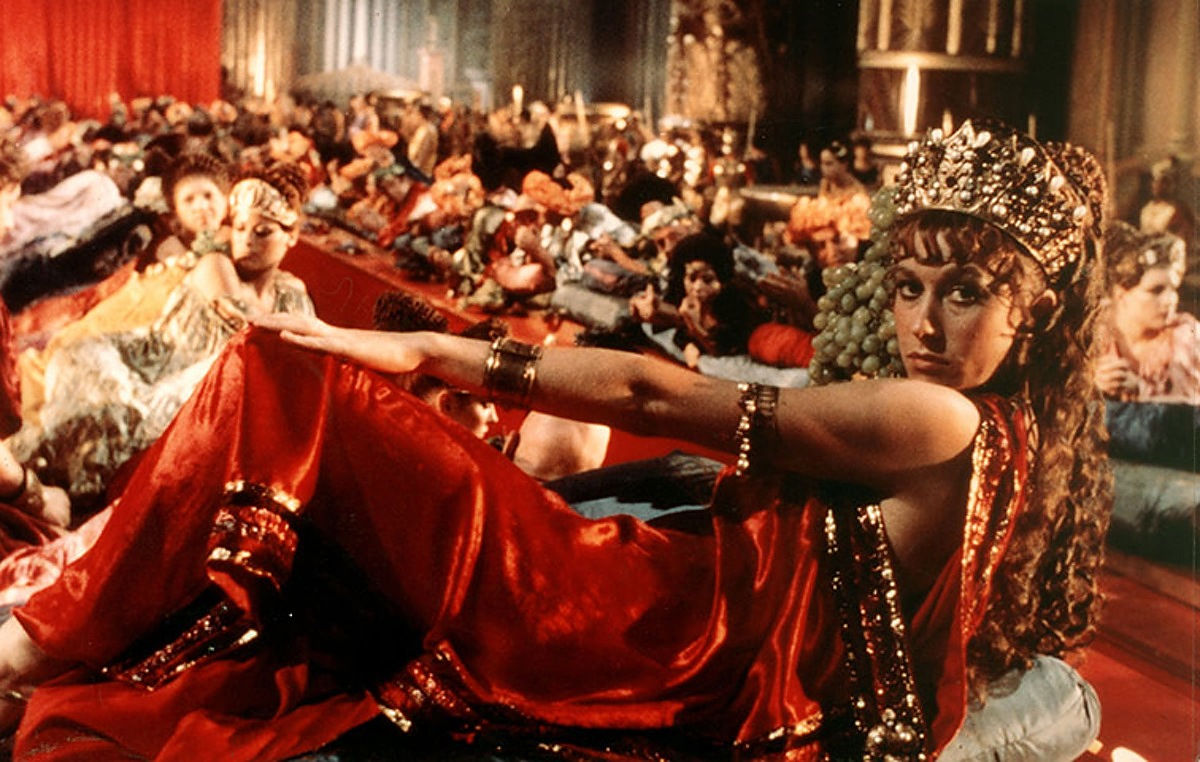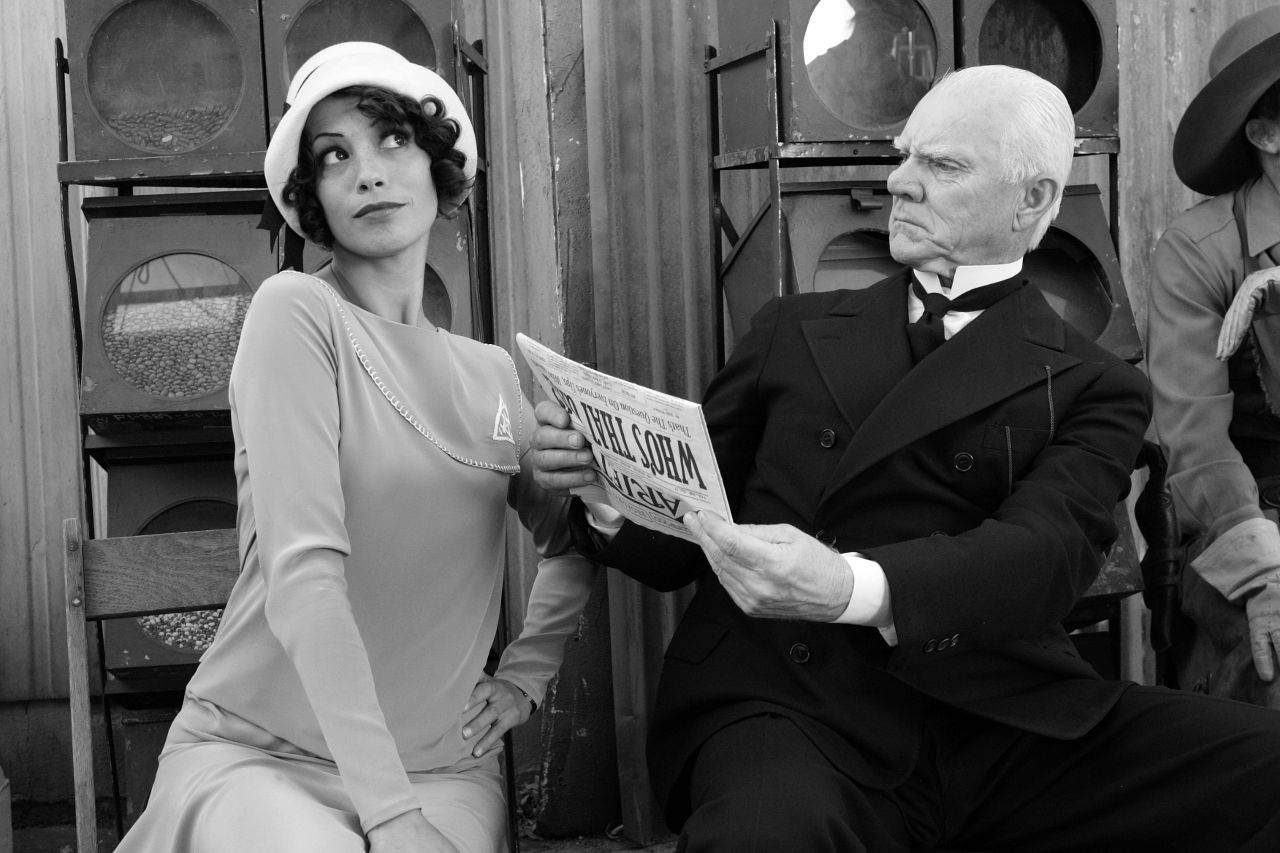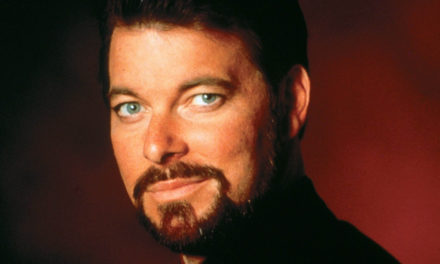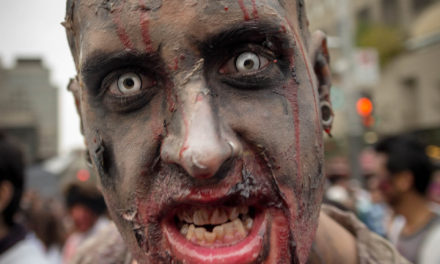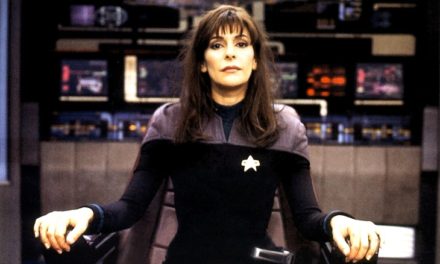One-on-One with
Malcolm McDowell:
On Stanley Kubrick,
Playing Bad Guys &
Surviving Hollywood
by Evelyn Reid
Originally published on About.com September 13, 2012
Pegged in GQ’s Bad Guys series as one of film history’s most influential villains, Malcolm McDowell’s incarnation as Alex in Stanley Kubrick’s cinematographic adaptation of author Anthony Burgess’ cautionary masterpiece A Clockwork Orange may very well be his most celebrated role. But it’s certainly not his only one.
Kept busy with a practically uninterrupted stream of on-camera and/or voice work in film, television, and even video games since as far back as the ’60s, McDowell is one of the last people in Hollywood you’d ever expect to go gently into that good night. I had a chance to chat with the cult thespian prior to his appearance at the 2012 edition of Montreal Comiccon to find out exactly what his secret is for achieving career longevity and maintaining credibility in an industry where talent supply has always, if inevitably, exceeded demand.
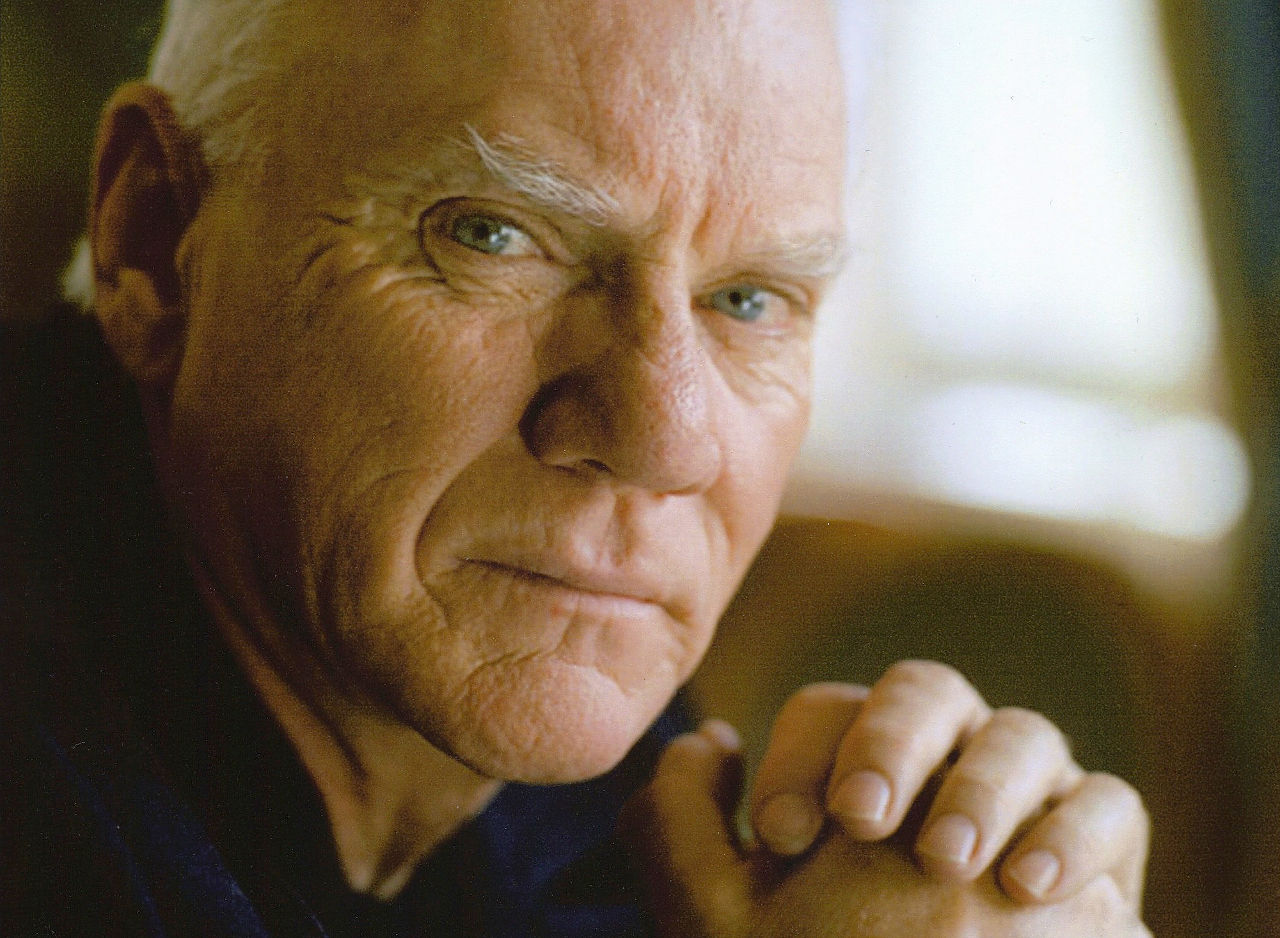
Photo courtesy of Malcolm McDowell
Evelyn Reid: You’ve played Satan, who needs no introduction. You’ve incarnated Caligula, the biggest whack job to ever lead the Roman Empire. You’re about to star as Vlad Tepes in Vamps, due for theatrical release in November. You killed off Captain Kirk in Star Trek: Generations. And the list goes on. Do you ever get weary of playing the villain? Or, from an acting standpoint, do bad guys actually have more fun?
Malcolm McDowell: I mean, you could grumble about being typecast or you could say “my God, I’m so lucky to play the villains because they’re such great parts.” And that’s the way I look at it but I never try to play them in the same way. They’re all very individualistic people. I always look for the fun in the part, the sense of humor or something. Even the most despicable person is rounded in some way. So I always try to bring out something that the audience can connect with. And yes, I do believe that a film is generally only as good as its heavy.*
Evelyn Reid: You know what fascinates me about you? How you’ve maintained this I’m-the-coolest-guy-ever aura. When I look at peers I consider of your calibre who can pull off serious, compelling lead and supporting roles as well as straight-to-video camp and yet still maintain a certain level of credibility, like Christopher Walken for example …
Malcolm McDowell: Oh, I love him.
Evelyn Reid: Do you? Me too. And both of you just keep getting new contracts. I think the biggest break I’ve seen in your CV is two years and yet you’ve been acting non-stop since the ’60s. What do you think you and Walken have done differently from others to be able to achieve this much career longevity and notoriety in such a fickle field?
Malcolm McDowell: I don’t know. I can’t talk for Chris, obviously, although I’ll tell you, he’s absolutely one of my favorite actors. He’s one of the great actors in America. There’s no question about that. And I know him, not well, but it’s a pleasure to know the man. He’s great. And then having seen him do that dance number to that video was just absolutely, I mean, it’s the cherry on the cake, isn’t it?
Evelyn Reid: It is.
Malcolm McDowell: You know, I really don’t know what the answer is. I think, honestly, that through the years, you accept that you’re going to get older. You know, when I started out, [I was] playing schoolboys, rebellious ones, but schoolboys. They wanted me to play schoolboys for 20 years! It was ridiculous. I do think you have to change, to grow as an actor in the same way that you grow as a person. You can’t just rely on what’s worked before. You have to be open and totally intuitive about the changes in your life, which of course are going to affect the changes in how you would prepare [for] a part. So that’s very important and I embrace getting older because it opens a whole other slew of parts for me to look at. My work is basically very intuitive. I don’t think too much about it. I just do it.
Evelyn Reid: Intuitive… intuitive in the sense of if you’re offered any role, you react along the lines of let’s just take that role and go with it and just do it?
Malcolm McDowell: Well, of course, I read [the script].
Evelyn Reid: [Laughter]
—
*“Heavy” in the acting world is synonymous with “villain.”
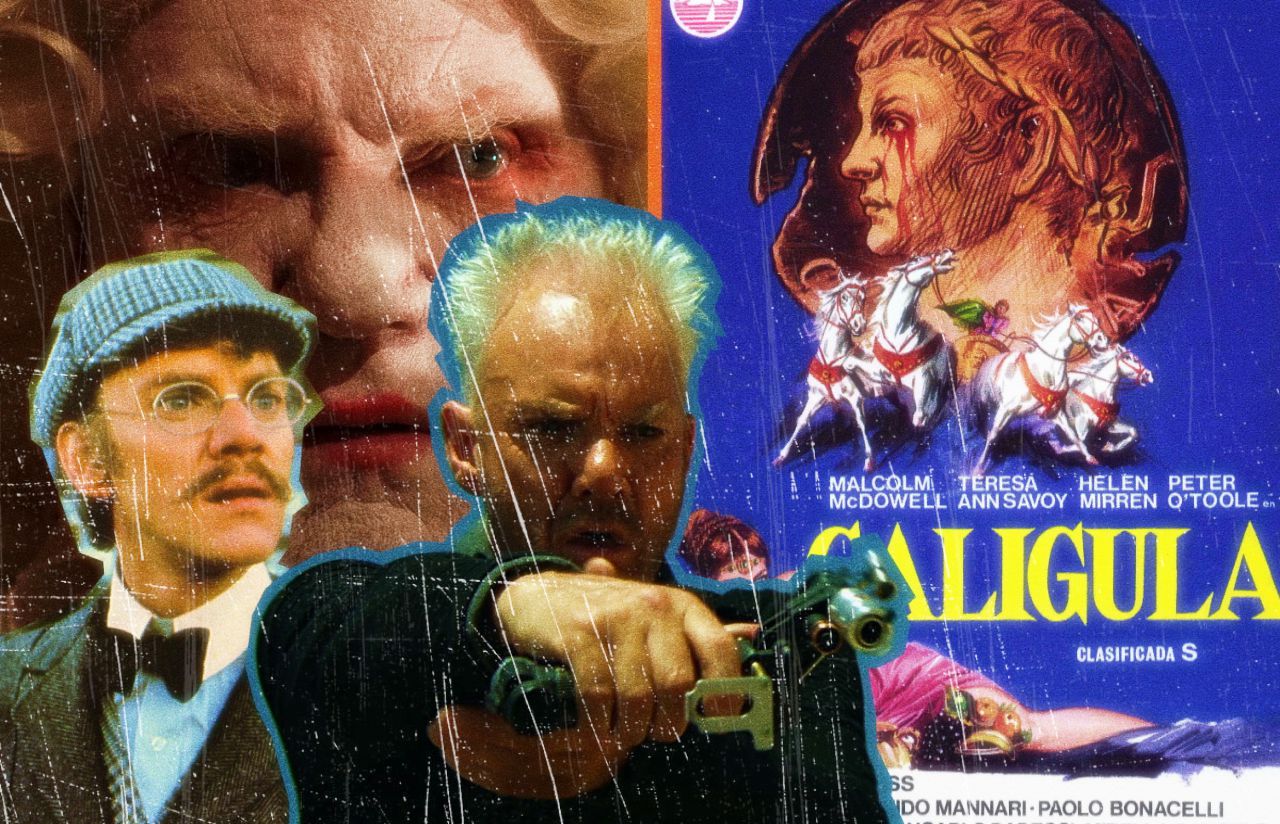
Photo montage by Clint Lewis
“But of course, it’s very easy to be great in, say, a Stanley Kubrick film because you’ve got a genius of a director to watch [over] it and make sure that you’re photographed beautifully and all the rest of it. But through the years, you have to learn to survive the not-so-good, [to survive] the people who don’t protect you. That’s something that I have in common with Chris [Walken] and actors that survive. It’s survivability, being able to look after yourself even though what’s all around you may be an absolute pile of caca.”
Malcolm McDowell: But if there’s anything I think I can do that will make it interesting, I’m up for it. But of course, it’s very easy to be great in, say, a Stanley Kubrick film because you’ve got a genius of a director to watch [over] it and make sure that you’re photographed beautifully and all the rest of it. But through the years, you have to learn to survive the not-so-good, [to survive] the people who don’t protect you. That’s something that I have in common with Chris [Walken] and actors that survive. It’s survivability, being able to look after yourself even though what’s all around you may be an absolute pile of caca.
Evelyn Reid: Was Kubrick was more careful about protecting your image as well the film’s image?
Malcolm McDowell: Well, of course I was the beneficiary of that. I don’t think he was thinking that [he was protecting me]. But he’s such a master that his vision of the film was so beautiful that I only benefited from that. Of course, I had to do my work and satisfy him with what I did on screen for him. Some directors are more nurturing with their actors than others.
Evelyn Reid: On that note, how was it working with Kubrick, a man who referred to himself as a “demented perfectionist.” How was it working with him compared to all your other director/actor experiences?
Malcolm McDowell: Well, I think honestly if you see the film, there’s a great sort of trust, respect and almost love between actor and director because you couldn’t possibly do a performance like that without that bond. And I had a very strong bond with him when I was working with him.
Evelyn Reid: And he knew you were Alex before you did.
Malcolm McDowell: Yes! He saw me in Lindsay Anderson’s film If, and asked me right there, when he just saw the film. He ran [the film] a few times, then he turned to his wife and said, “we have found our Alex.” And I didn’t have a clue. I just went to meet him and chit chat, sort of small talk. Then he gave me the book [A Clockwork Orange] and I read it. It took me a week, I read it three times, and then I called him when I was ready. And I realized it was an amazing book. But rather difficult, you know, it’s not a quick read.
Evelyn Reid: Noooo, it’s not. Just the lexicon is…
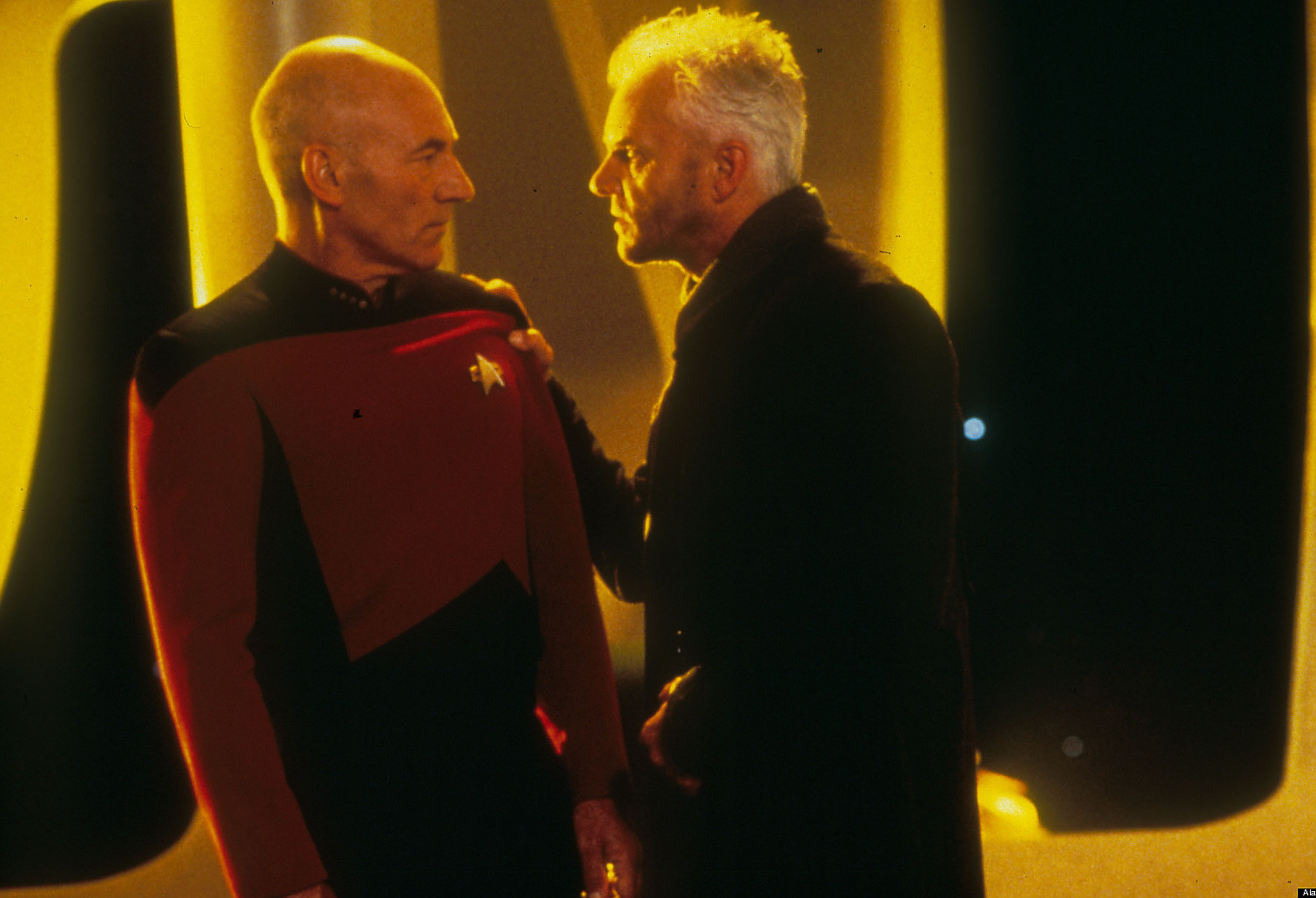
Above from left to right: Patrick Stewart and Malcolm McDowell in Star: Trek Generations (1994).
Malcolm McDowell: It’s a difficult language and all that. Of course, I was looking at it from the point of view of playing [a character in it] so I was very careful with the way I read it and by the third time I read it, I got chills, thinking, “oh my… this is going to be amazing, but how am I going to do it?” I had no idea how to do it, right up until the very beginning [of shooting]. And I was cast six months before we started shooting. And I still didn’t know how to play [Alex].
Evelyn Reid: How did you figure it out then?
Malcolm McDowell: I just had a feeling about it but I didn’t really know. It was my director friend Lindsay Anderson, who was such a big influence in my life, he gave me the key to [playing Alex]. I asked him to read the script. And he told me there was a great closeup of me in If where I’m coming into the gymnasium to be beaten and I look at my tormentors. I look at them and smile. He said, “that’s the way you play Alex.” And it was just a stroke of genius on his part because it gave me the key to the character, which, by the way, after the first day, I never thought about again, because I was in it.
Evelyn Reid: And you were able to just do it. My next question loosely ties into what you mentioned earlier about surviving and what not. From I understand, it took a full week just to film the infamous “Singing in the Rain” scene. But here’s the thing. In today’s world with HD video, tight production budgets and shorter production schedules, do you think films of A Clockwork Orange’s calibre and level of insight are even possible within this modern—I call it fast food—production style?
Malcolm McDowell: Yes. I do. But you know, if you get a director like Kubrick or Spielberg or any of the top directors, of course they can do whatever they want, within reason. I’m sure you can make movies like this, but they are few and far between now simply because, you know, they just market to the kids and they’re just making green screen movies, comic book movies, because they get huge returns on the first weekend and that’s more or less where we’re at. I mean, Warner Brothers, this great studio, they don’t even have a classics division where you can [re-release] a $10 million movie that’s for an adult audience. That’s gone.
Evelyn Reid: And yet, I thought A Clockwork Orange was one of Warner Brothers’ best-sellers of all time.
Malcolm McDowell: Yes. It is. And of course, I think it’s rather short-sighted, but hey, I don’t run the studio. And I’m not gonna be asked to soon, so…
Evelyn Reid: It’s like they’re running [the studios] like the stock market. It’s all about short-term gains as opposed to the long-term picture.
Malcolm McDowell: Ah yeah. Well, that’s really… listen, that’s a whole other conversation. [Laughter]. We can only do what we do and you know, independent movies are getting more and more difficult [to make]. It doesn’t mean we should give up. We try and do the things we want to do even though there’s no market for them now, [so] we’re told.
Evelyn Reid: It is what is it is.
Malcolm McDowell: It is what it is.
Evelyn Reid: Malcolm, you’re coming up to Montreal Comiccon in a couple of days. Is this going to be your first time in Montreal?
Malcolm McDowell: No. I’ve been there a few times before. I love the city and I can’t wait to come back.
Evelyn Reid: Anything in particular you’re looking forward to?
Malcolm McDowell: Really good food! [There’s] great food in Montreal, in some of its restaurants, and I know I’ll be in at least one or two of them.
Evelyn Reid: And you won’t tell us which ones, will you? [Laughter]
Malcolm McDowell: Oh, I don’t know yet! I’ll find out when I get there.
One-on-One with Malcolm McDowell: On Stanley Kubrick, Playing Bad Guys & Surviving Hollywood
by Evelyn Reid
Originally published on About.com September 13, 2012
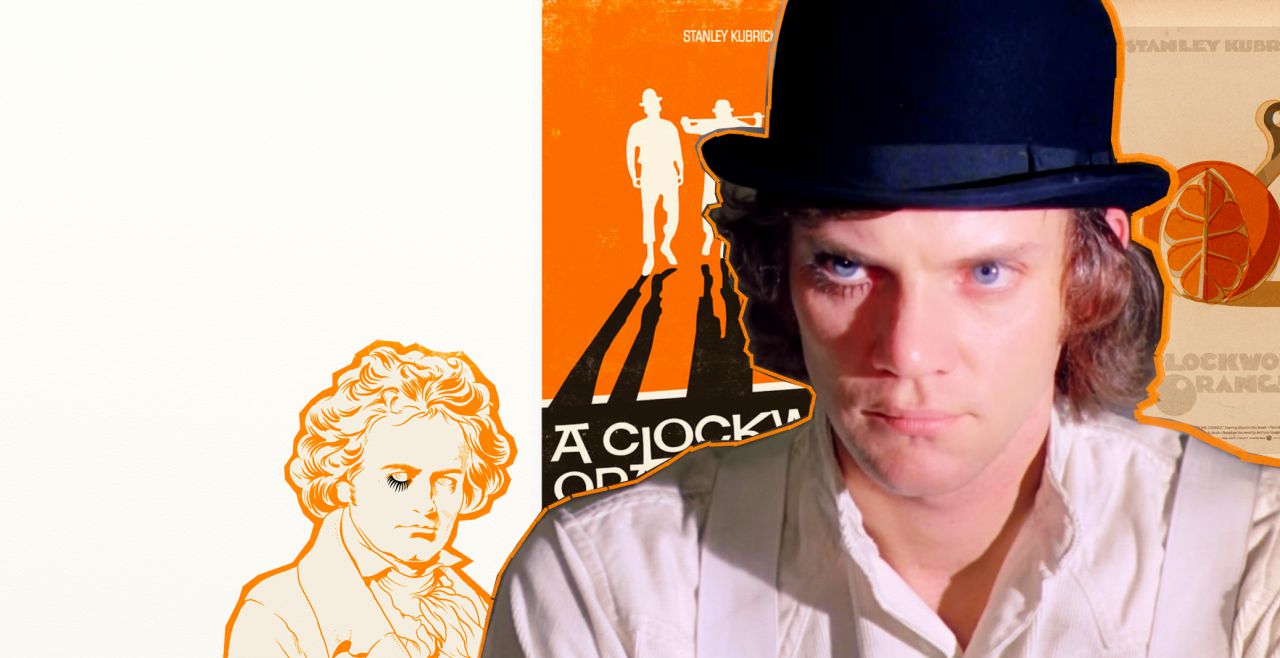
Photo montage by Clint Lewis
Pegged in GQ’s Bad Guys series as one of film history’s most influential villains, Malcolm McDowell’s incarnation as Alex in Stanley Kubrick’s cinematographic adaptation of author Anthony Burgess’ cautionary masterpiece A Clockwork Orange may very well be his most celebrated role. But it’s certainly not his only one.
Kept busy with a practically uninterrupted stream of on-camera and/or voice work in film, television, and even video games since as far back as the ’60s, McDowell is one of the last people in Hollywood you’d ever expect to go gently into that good night. I had a chance to chat with the cult thespian prior to his appearance at the 2012 edition of Montreal Comiccon to find out exactly what his secret is for achieving career longevity and maintaining credibility in an industry where talent supply has always, if inevitably, exceeded demand.

Photo courtesy of Malcolm McDowell
Evelyn Reid: You’ve played Satan, who needs no introduction. You’ve incarnated Caligula, the biggest whack job to ever lead the Roman Empire. You’re about to star as Vlad Tepes in Vamps, due for theatrical release in November. You killed off Captain Kirk in Star Trek: Generations. And the list goes on. Do you ever get weary of playing the villain? Or, from an acting standpoint, do bad guys actually have more fun?
Malcolm McDowell: I mean, you could grumble about being typecast or you could say “my God, I’m so lucky to play the villains because they’re such great parts.” And that’s the way I look at it but I never try to play them in the same way. They’re all very individualistic people. I always look for the fun in the part, the sense of humor or something. Even the most despicable person is rounded in some way. So I always try to bring out something that the audience can connect with. And yes, I do believe that a film is generally only as good as its heavy.*
Evelyn Reid: You know what fascinates me about you? How you’ve maintained this I’m-the-coolest-guy-ever aura. When I look at peers I consider of your calibre who can pull off serious, compelling lead and supporting roles as well as straight-to-video camp and yet still maintain a certain level of credibility, like Christopher Walken for example …
Malcolm McDowell: Oh, I love him.
Evelyn Reid: Do you? Me too. And both of you just keep getting new contracts. I think the biggest break I’ve seen in your CV is two years and yet you’ve been acting non-stop since the ’60s. What do you think you and Walken have done differently from others to be able to achieve this much career longevity and notoriety in such a fickle field?
Malcolm McDowell: I don’t know. I can’t talk for Chris, obviously, although I’ll tell you, he’s absolutely one of my favorite actors. He’s one of the great actors in America. There’s no question about that. And I know him, not well, but it’s a pleasure to know the man. He’s great. And then having seen him do that dance number to that video was just absolutely, I mean, it’s the cherry on the cake, isn’t it?
Evelyn Reid: It is.
Malcolm McDowell: You know, I really don’t know what the answer is. I think, honestly, that through the years, you accept that you’re going to get older. You know, when I started out, [I was] playing schoolboys, rebellious ones, but schoolboys. They wanted me to play schoolboys for 20 years! It was ridiculous. I do think you have to change, to grow as an actor in the same way that you grow as a person. You can’t just rely on what’s worked before. You have to be open and totally intuitive about the changes in your life, which of course are going to affect the changes in how you would prepare [for] a part. So that’s very important and I embrace getting older because it opens a whole other slew of parts for me to look at. My work is basically very intuitive. I don’t think too much about it. I just do it.
Evelyn Reid: Intuitive… intuitive in the sense of if you’re offered any role, you react along the lines of let’s just take that role and go with it and just do it?
Malcolm McDowell: Well, of course, I read [the script].
Evelyn Reid: [Laughter]
—
*“Heavy” in the acting world is synonymous with “villain.”

Photo montage by Clint Lewis
“But of course, it’s very easy to be great in, say, a Stanley Kubrick film because you’ve got a genius of a director to watch [over] it and make sure that you’re photographed beautifully and all the rest of it. But through the years, you have to learn to survive the not-so-good, [to survive] the people who don’t protect you. That’s something that I have in common with Chris [Walken] and actors that survive. It’s survivability, being able to look after yourself even though what’s all around you may be an absolute pile of caca.”
Malcolm McDowell: But if there’s anything I think I can do that will make it interesting, I’m up for it. But of course, it’s very easy to be great in, say, a Stanley Kubrick film because you’ve got a genius of a director to watch [over] it and make sure that you’re photographed beautifully and all the rest of it. But through the years, you have to learn to survive the not-so-good, [to survive] the people who don’t protect you. That’s something that I have in common with Chris [Walken] and actors that survive. It’s survivability, being able to look after yourself even though what’s all around you may be an absolute pile of caca.
Evelyn Reid: Was Kubrick was more careful about protecting your image as well the film’s image?
Malcolm McDowell: Well, of course I was the beneficiary of that. I don’t think he was thinking that [he was protecting me]. But he’s such a master that his vision of the film was so beautiful that I only benefited from that. Of course, I had to do my work and satisfy him with what I did on screen for him. Some directors are more nurturing with their actors than others.
Evelyn Reid: On that note, how was it working with Kubrick, a man who referred to himself as a “demented perfectionist.” How was it working with him compared to all your other director/actor experiences?
Malcolm McDowell: Well, I think honestly if you see the film, there’s a great sort of trust, respect and almost love between actor and director because you couldn’t possibly do a performance like that without that bond. And I had a very strong bond with him when I was working with him.
Evelyn Reid: And he knew you were Alex before you did.
Malcolm McDowell: Yes! He saw me in Lindsay Anderson’s film If, and asked me right there, when he just saw the film. He ran [the film] a few times, then he turned to his wife and said, “we have found our Alex.” And I didn’t have a clue. I just went to meet him and chit chat, sort of small talk. Then he gave me the book [A Clockwork Orange] and I read it. It took me a week, I read it three times, and then I called him when I was ready. And I realized it was an amazing book. But rather difficult, you know, it’s not a quick read.
Evelyn Reid: Noooo, it’s not. Just the lexicon is…

Above from left to right: Patrick Stewart and Malcolm McDowell in Star Trek: Generations (1994).
Malcolm McDowell: It’s a difficult language and all that. Of course, I was looking at it from the point of view of playing [a character in it] so I was very careful with the way I read it and by the third time I read it, I got chills, thinking, “oh my… this is going to be amazing, but how am I going to do it?” I had no idea how to do it, right up until the very beginning [of shooting]. And I was cast six months before we started shooting. And I still didn’t know how to play [Alex].
Evelyn Reid: How did you figure it out then?
Malcolm McDowell: I just had a feeling about it but I didn’t really know. It was my director friend Lindsay Anderson, who was such a big influence in my life, he gave me the key to [playing Alex]. I asked him to read the script. And he told me there was a great closeup of me in If where I’m coming into the gymnasium to be beaten and I look at my tormentors. I look at them and smile. He said, “that’s the way you play Alex.” And it was just a stroke of genius on his part because it gave me the key to the character, which, by the way, after the first day, I never thought about again, because I was in it.
Evelyn Reid: And you were able to just do it. My next question loosely ties into what you mentioned earlier about surviving and what not. From I understand, it took a full week just to film the infamous “Singing in the Rain” scene. But here’s the thing. In today’s world with HD video, tight production budgets and shorter production schedules, do you think films of A Clockwork Orange’s calibre and level of insight are even possible within this modern—I call it fast food—production style?
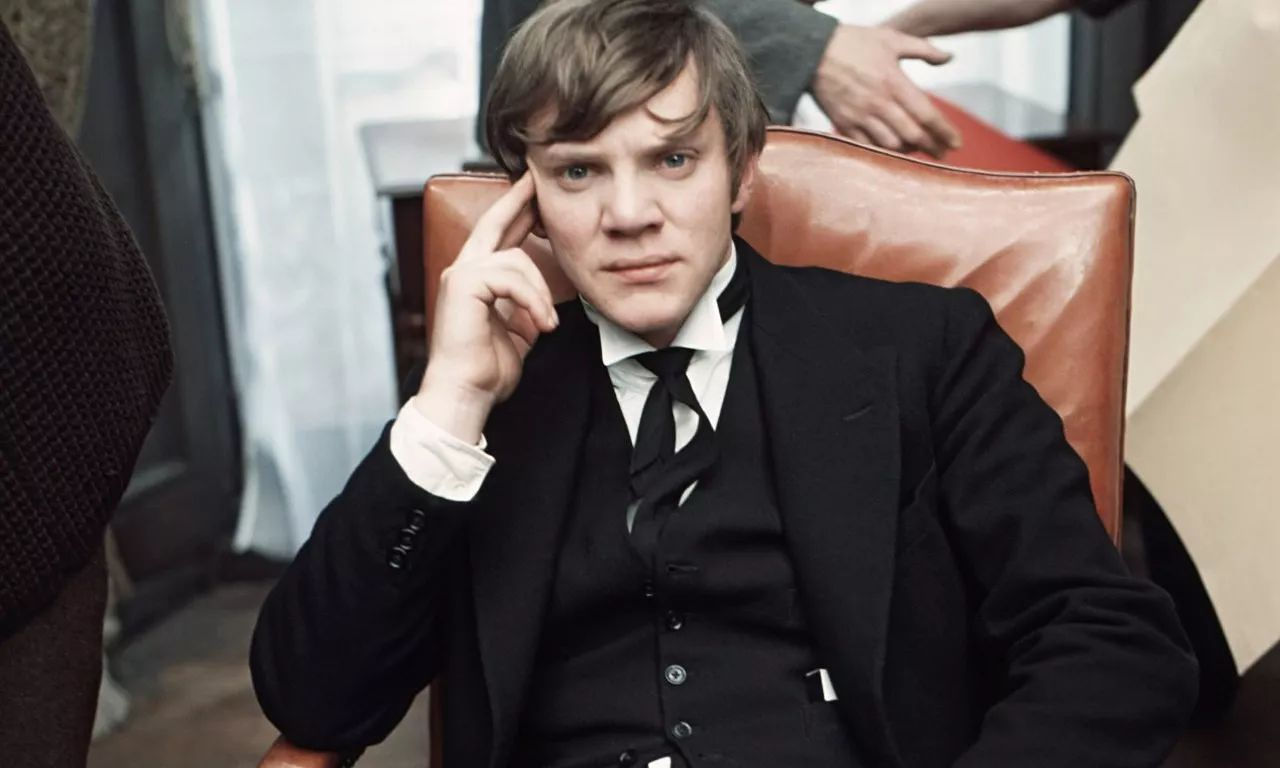
Above: Malcolm McDowell in Lindsay Anderson’s seminal satire, If (1968).
Malcolm McDowell: Yes. I do. But you know, if you get a director like Kubrick or Spielberg or any of the top directors, of course they can do whatever they want, within reason. I’m sure you can make movies like this, but they are few and far between now simply because, you know, they just market to the kids and they’re just making green screen movies, comic book movies, because they get huge returns on the first weekend and that’s more or less where we’re at. I mean, Warner Brothers, this great studio, they don’t even have a classics division where you can [re-release] a $10 million movie that’s for an adult audience. That’s gone.
Evelyn Reid: And yet, I thought A Clockwork Orange was one of Warner Brothers’ best-sellers of all time.
Malcolm McDowell: Yes. It is. And of course, I think it’s rather short-sighted, but hey, I don’t run the studio. And I’m not gonna be asked to soon, so…
Evelyn Reid: It’s like they’re running [the studios] like the stock market. It’s all about short-term gains as opposed to the long-term picture.
Malcolm McDowell: Ah yeah. Well, that’s really… listen, that’s a whole other conversation. [Laughter]. We can only do what we do and you know, independent movies are getting more and more difficult [to make]. It doesn’t mean we should give up. We try and do the things we want to do even though there’s no market for them now, [so] we’re told.
Evelyn Reid: It is what is it is.
Malcolm McDowell: It is what it is.
Evelyn Reid: Malcolm, you’re coming up to Montreal Comiccon in a couple of days. Is this going to be your first time in Montreal?
Malcolm McDowell: No. I’ve been there a few times before. I love the city and I can’t wait to come back.
Evelyn Reid: Anything in particular you’re looking forward to?
Malcolm McDowell: Really good food! [There’s] great food in Montreal, in some of its restaurants, and I know I’ll be in at least one or two of them.
Evelyn Reid: And you won’t tell us which ones, will you? [Laughter]
Malcolm McDowell: Oh, I don’t know yet! I’ll find out when I get there.
Passing through Montreal in September 2012 as a celebrity guest at Comiccon, iconic actor Malcolm McDowell has worked with a who’s who of contemporary film’s finest actors. And directors. And during a Comiccon panel, he shot the breeze on the lot and then some, mostly in jest and with ample tongue in cheek, dishing out one of the wittier oratorical displays on Comiccon record.
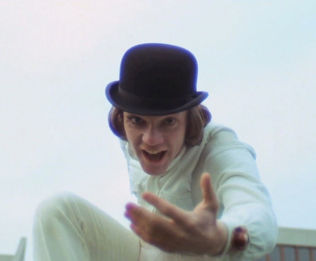
On A Clockwork Orange Character Alex DeLarge
“His name is really Alex. I added ‘DeLarge’. It was a joke. It was meant to mean the size of my penis. DeLarge. I put the “de” in there. I thought it sounded more, you know, French.”
On Darth Vader
“He’s not an evil man. He’s a misunderstood man who had a very, very unhappy childhood.”
On His Friendship with Patrick Stewart and William Shatner
“You assume that we’re great friends? We’re good actors.”
On Patrick Stewart
“Of course we’re friends! I’ve known Patrick Stewart pretty much as long as I’ve been acting. Although, I was never really friendly to him because he’s not the sort of cuddly type, is he. And he had a bald head even in those days, in 1965. I like to say, well, he was playing old men even then. But he’s a wonderful guy and he’s a wonderful actor. You know, I’ve always sort of kept tabs on people that I’ve worked with, you know, find out what he’s been doing. He was at the Royal Shakespeare Company for half of his life playing this, that and the other, always pontificating.”
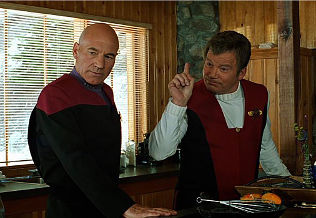
On William Shatner
“As for Bill, well, I had just met him when I killed him. You’ve got to love Bill Shatner. Dont’cha? I mean how could you not love Bill Shatner? He’s a fantastic figure of fun, I think. He can laugh at himself. It actually amused me because when I had done the deed and killed him the first time, I sat on a chair—we were up on a mountain outside of Vegas, in the Valley of Fire—anyways, we’re sitting on this mountain and he comes over with this recorder and says, “mind if I ask you a few questions?”
I go, “no, what about?”
He says, “I’m writing a book about [Star Trek: Generations]. I gotta get everything for what it’s worth out of this.”
I go, “oh, okay.”
So he goes, “Okay, right, Malcolm, how does it feel to have killed one of television’s great characters?”
I said, “Bill, well, to be honest with you, I think half the people are going to be thrilled and half are going to be furious.”
He said, “oh yeah? Who’s going to be thrilled?”
I said “the people who have HAD IT UP TO HERE FOR THIRTY YEARS, BILL!”
That’s a true story.”
On William Shatner
“He’s a very generous man. Every time that I’ve been doing some charity thing and we’d ask Bill [to join], he’d always be there. He’s a good human being. And I’m glad to call myself a friend of his.”
On Comparing David Caruso With William Shatner
“I’ve worked with both. That is true. But I would never in a million years compare David Caruso with the great William Shatner. It’s acting from A to B, that one.”
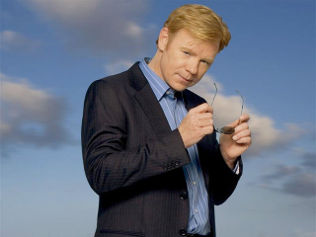
On David Caruso
“I love the glasses. It’s just [pause] so ridiculous. You know? And this sideways glance stuff. It’s like, where’s he looking? I thought I was in this scene. Very weird. I don’t know who put these thoughts into the man’s head.”
On CSI: Miami
Very successful show. But who am I? I mean, that’s why I’m not running a television company. Or a film company. Because I would have that off the air within a MILLISECOND. But people love that crap!”
On David Caruso
“I had fun on that show. I loved pulling his leg. I would go up to him say “hello grumpy!”
On South Park
“The Canadian song is hilarious. Let’s face it.”
On Playing Dr. Loomis in Halloween and Halloween II
“I thought if I was going to do another Halloween, let’s make him an absolute prick.”
Advice to an Aspiring Actor
“Don’t do it. Please don’t. Get a job where you can pay your mortgage. But having said that to a young aspiring actor, he’s not going to take any notice of me. And why should he? Why should he take notice of anybody? If he really wants to be an actor, he’ll be an actor.”
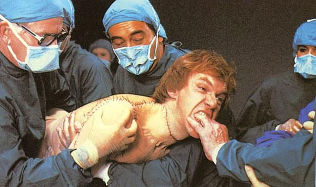
On Being an Actor
“You have to have the skin of a rhino. You’re always on somebody’s list and you’re always being rejected. It doesn’t matter who you are. Even Tom Cruise, I see, has been rejected recently.”
On Being in Caligula
“That was only a year of my life. Wasted.”
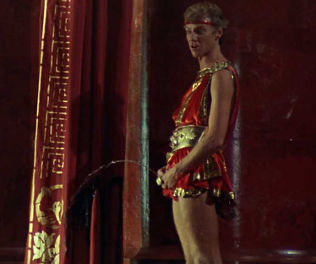
On Trusting Gore Vidal That Caligula Was Worth It
“I sort of had fun. It was a weird experience. Gore Vidal wrote the script originally and he’s the one who got me involved. And if there’s a script by Gore Vidal, one of America’s great novelists, you tend to say “yeah, I’d love to do it.” And of course, the producer is Bob Guccione, a known pornographer. I said to Gore “well, who is this Guccione?” He goes “just think of him as one of the Warner Brothers.”
On the Strangeness of Being in Caligula
“It was sort of a fascinating year of ups and downs, of strangeness, of working with the great, great Peter O’Toole, whom I adore and John Gielgud, and Helen [Mirren], whom I kind had strung on to come out to Rome to do that part. It was just such a mess. I always feel when I see bits of it, that God, there’s such a good film screaming to get out! And it just never did. There were too many cooks. And of course Guccione, he kept adding pornography, sticking it in there, to use a metaphor that we all know. So he stuck in two lesbians going at it for ten minutes, then two gay guys, then two this and that, and my God! What a kerfuffle. When I first saw the film, I thought, I don’t remember THAT. Well, that’s because it was shot shot two years later!”
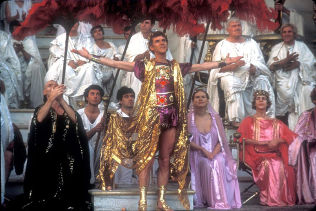
On His Twelve Year Old Son Discovering Him in Caligula
My twelve-year-old, my oldest son, he went with his pals to Blockbuster, when Blockbusters were around. Videos, remember those? And he was telling me about this excursion that these boys had and he said, “Dad, you know, we ended up in the X-rated section.” I went, “yeah, of course.” And he goes “Daaad, you have a film there!” I said “I know I do, I’m very proud of it!” He goes “Oh my God, all my friends think you’re so cool!”
On Almost Turning Down Roles on Heroes and Entourage
“Now I’ve done this twice. The first time was with Entourage. I was like, “I dunno, they offered me this thing in this thing called Entourage.” And my son, he went, “Dad! Oh my God! That’s such a great show!” And I went, “Oh my God! I turned it down! I better call my agent right now!” And I did the same thing with Heroes because I really didn’t know what the heck it was. I don’t really watch those sort of weird dramas on television.”
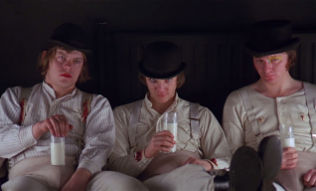
On His Favorite A Clockwork Orange Scene
I’ve got lots of favorites many that I remember quite fondly. Of course the opening shot is uhm, I remember it quite distinctly. It’s such an arresting shot. And Kubrick actually operated the shot. It was on a track and it was a big telephoto lens. And it was pulling back. So we did this shot. It took all day to do it. And a couple of days later, Stanley came up to me and he said, “I saw the shot.” I said, “how was it?” He said, “it was great. But did you realize that when you, you kind of lifted your glass and you made a gesture to the audience.” I said, “yes, yes of course.” He said, “you did that on purpose?” I went, “well yes Stanley, yes I did.” He said, “well, why did you do that?” I said, “well, I’m just subtly telling the audience that they’re about to go on one hell of a ride!” He went, “oooh, oh, well, that’s good.” He had no idea what I was doing.”
On Anthony Burgess
“Let’s talk about genius. Anthony Burgess wrote this book. And Kubrick took everythingfrom this book. Without Burgess, there would be no A Clockwork Orange. He was the visionary, and an extraordinary man, he was.”
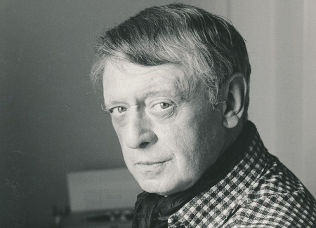
On the Depths of Anthony Burgess
I spent a week with him in New York when the movie opened. And, oh my God, it was hilarious. He was one of the funniest men I’ve ever met. And a great raconteur.
He was very much into his bowel movements. I’d go to pick him up in the car, he was staying at the Algonquin, he’d get in, sit in the car and he’d go “uhhohhh.” I’d go, “how are you Anthony?” He’d go “uhhh, have you had a dump yet?” I’d go, “yes, as a matter of fact, I had a very nice bowel movement this morning.” He went, “uhhhm really? I haven’t. It’s now going to be 4 o’clock before I can do anything.” So that’s how we started our day with Anthony.”
On David Warner
“… and David Warner, who I’d been at Stratford with, with Patrick Stewart in 1966 where David was Hamlet. He played one of the great Hamlets and I was the fourth English Herald, or something. We were great friends. In those days he was very shy, a bit like Blifil in Tom Jones, gangly and spotty and weird, but a great guy. And he was so brilliant in Time after Time as Jack the Ripper.”
On Whether Him and David Warner Both Appearing in Different Star Trek Movies Was a Coincidence
“No. That’s not a coincidence. That was planned in the great scheme of things, that we would appear in the same show, not together, but two or three years apart. This is the way that mysteries sometimes turn out.”
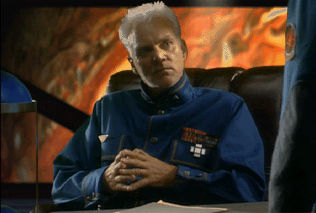
On What Attracted Him to Play the Role of in the Video Game Wing Commander
“Money??? Who said that?! I heard that! … he’s quite right. I have to admit it. I wasn’t actually going to say it. I was going to give you some bulls**t answer.”
On Mark Hamil
“What a nice man. What a charmer. Where is he? Have you seen him? Haven’t seen him for a bit but Mark is a lovely guy. He was in a movie I made called Britannia Hospital. And I know he found it very hard to move on with his career, but you know, he’s done millions of voice overs and stuff. He was one of the real forerunners of all these video games so we have a lot to thank Mark Hamil for, actually. And he’s a very talented guy.”
On Playing Bad Guys
“I’m asked to play so many bloody bad people. It’s just endless. Which is fine. I’ve got to pay my mortgage. But the thing is, I’m given six scenes to make people hate me. And I always love that challenge. I really do.”
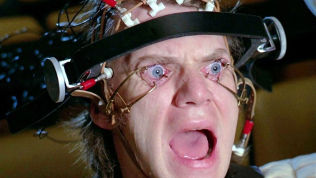
On Making the Audience Uncomfortable
“I like to put the audience in a rather uncomfortable position because I like to make these immoral men — so-called by what they do — I like to make them irresistible in a way, [make them] have a great sense of humor, which you know rarely does the hero have any humor at all. Have you ever noticed that in these American movies? Oh my God. Snore. Snooze. Hello?!”
On The Evolution of His Acting Since His First On-Screen Role in If
“You know, the truth is … I’m worse. I’m serious. That was the purest performance I could ever give. Because it was the first. As soon as I started learning what I was doing, I screwed it all up. Because I knew it was an effect, I knew it was a manipulation. I was actually becoming a professional actor. But the first major role on film is the purest. I wasn’t acting, I didn’t know how else I would do it. It was just pure instinct.”
On Acting in Star Trek
“Star Trek is fluffy stuff. It’s not real acting. It’s posturing!”
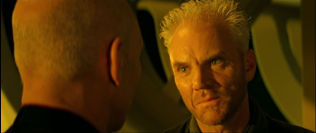
On Peter O’Toole
“O’Toole is one of the great actors, of course! And hilariously funny. I loved him. I do. Sadly, he retired but of course he’s 80. He’s probably just had enough.”
On Differing Reactions to A Clockwork Orange
“It’s laced with humor. Wicked humor. When it came out, there wasn’t one laugh in the theatre, the whole way through. In England, they sort of laughed a bit but in America? Not one laugh. I thought, “my God! Maybe it’s the American sense of humor or something.” I didn’t get it. But of course, they were completely overwhelmed with the sort of violence and what was going on. You know, it’s not even that violent a movie in terms of physical violence, it’s all rather psychological.”
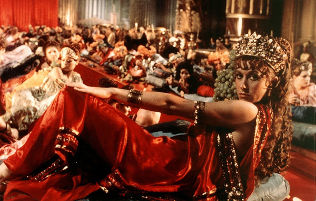
On Helen Mirren
“I’m thrilled that she went on to have a great career. I’ve always considered Helen to be the finest actor of her generation, which is of course my generation. I loved her. I thought she was brilliant.”
On Which Actors He Enjoyed Working With So Much That He’d Like to Do Another Film With Them
“My mind is a blank. I can never remember who the hell I worked with.”
